#but also.. statement about how we value different forms of literature?
Text
I have such a cool idea for my grad cap and if I can pull it off I’m gonna be so excited
#listen ok so#I’m pulling a bunch of my fav quotes from my fav pieces of writing#and then a couple quotes from my own for funnies to rep the creative writing side of my college education😂#but for the lit stuff I want to take quotes from a range of stuff#ranging from classic lit (so far there’s emerson - plath - melville - and Whitman)#to fanfic!#and I think what I’m gonna do is type them all in a nice font on a piece of paper#altogether without bothering to put who the quote belongs to#and so it’s like#yay my favorite hopeful quotes for the future sorta related to graduation and sorta just my favs#but also.. statement about how we value different forms of literature?#like they’re all gonna be equal there cause you won’t know who wrote what#unless the person reading it is an English nerd like me ig… but everyone ELSE#anyway#that’s just the background. the rest is gonna be decorated with ribbon or flowers or something and have block letters over the quotes#but I’m excited
5 notes
·
View notes
Text
[Commentary] Media Literacy: Dangers Of Romanticizing Other Cultures & Recognizing Soft Power
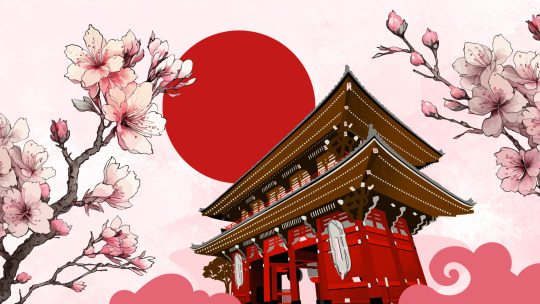
By: Peggy Sue Wood | @pswediting
This is a topic that feels a little hypocritical to be writing considering the fact that our content seems to be all about romanticizing stories from other countries as an anime blog, but that is exactly why it is important to discuss. In our “Welcoming 2024” message, I posted on anime going from niche to mainstream, and how fans are involved in that. I stand by my statement that I think it is a really cool development. However, I also recognize that fans might romanticize the culture as a result of only seeing its “better” sides in anime and online.
No culture, no society, and no group is perfect. Using even minimal media literacy can show that about any culture (your own and others) and today’s post, as much as I loathe to do so, is about this idea.
Let’s start with the idea of “soft power,” a concept regarding international relations that refers to a country’s ability to influence other countries and achieve its objectives through non-coercive means, such as culture, ideology, and diplomacy. Unlike “hard power,” which relies on military or economic coercion, soft power seeks to attract and persuade other countries to adopt the ideas, values, and interests of the country projecting it, often through entertainment and educational means.
Soft power is often associated with a country’s cultural exports, such as movies, music, and literature, as well as its diplomatic efforts to build alliances and promote cooperation on issues of common interest. By projecting a positive image and promoting values that are attractive to others, a country can increase its influence and achieve its goals without resorting to force or threats.
Japan specializes in “soft power” and they’re proud of it. They should be, as the media is engaging and the methodology—for now—remains somewhat positive.
However, that does not mean that we shouldn’t be aware of it nor combat (through similar means) some of the ideas being perpetuated that conflict with our cultural values because romanticizing another culture can be problematic for a number of reasons.
Firstly, it can create a distorted and oversimplified view of a culture that fails to capture its complexities and nuances. This can lead to stereotyping and misunderstanding, as well as the erasure of important aspects of the culture that do not fit into the romanticized narrative.
Using Japan as a continuing example, the country has a massive issue with sexism and sexual assault. The country also is resistant to immigration, and with a rapidly aging population, and not enough births to replace the aging populace. This resistance to having more children or welcoming immigrants is a detrimental point for their society.
We see this come out in their media, as women are often shown in less diverse ways than their male counterparts on screen (rather it be in animation or live-action). That’s not just fan service, that’s a form of objectification, and, as surprising as it may seem, it can lead to dehumanizing people.
In an anecdotal example, one of my former professors described being forcibly kissed on trains in Hong Kong and Japan when she was younger. Her father moved them frequently as he served in different military bases and the people who made such moves against her were surprised by her “reluctance” and fighting. They had been introduced to foreign media where women were less conservative and wanton so the idea that a foreign girl would dislike being greeted with on-the-mouth kissing or not want to be sexualized was “strange.” They even made defenses that she was being two-faced or “tsundere.” This could stem from how a lot of tsundere characters are coded as European/Caucasian foreigners.
These concepts overlap the idea of the dangers of a single story.
This is true of America and other countries too. In some parts of the world, the US is seen as an amazing place, and in others, we’re seen as bullies. Not aided by the behavior of some tourists.
Just as we regularly break down Western culture for both enjoyment purposes and educational examinations into cultural insights, so too should we examine Eastern cultures with depth.
People and traditions of the culture being romanticized can reduce them to mere commodities for consumption or entertainment, perpetuating power imbalances and reinforcing attitudes by presenting the romanticized culture as either above or below when the reality is neither. It is just a different culture from our own.
While our blog is appreciative of Japan and other foreign media, and we try to respect other cultures for what they are, we think that it is crucial to do so in a way that acknowledges and respects their complexities and histories and does not reduce them to a simplistic or idealized fantasy. We hope that those of you reading also take this into consideration.
What we see is not always what it appears to be, and so we encourage media literacy. There are a lot of different definitions for this, but ultimately media literacy is “the ability to access, analyze, evaluate, create, and act using all forms of communication.” It is a skill you already use every day because media is all around us: from pictures on a wall, to articles on your phone, to music being heard. Even while reading this post you are experiencing a form of media literacy as you interpret the writing here because media literacy refers to looking at the message of a piece of media (the values and ideas that are promoted by the media or what the creators have intended to message to the audience) and what the media’s effects are (their influences or the results as seen on the audience).
Since all media is coded by the creators’ experiences and understanding, understand too that all messages are decoded by the receivers’ experiences and understanding. Like emojis having different meanings for different age groups or how one person may enjoy an anime while another hates it.
Consider John Bohannon’s “Who’s Afraid of Peer Review?” Article and the surrounding incident to the experiment described. Ten years ago, between January and August 2013, John Bohannon submitted fake scientific papers to over 300 journals owned by as many fee-charging, open-access publishers. Publishers we may generally trust at first glance like The Journal of Natural Pharmaceuticals—a journal that promised all articles were peer-reviewed. Bohannon writes in his article, “Who’s Afraid of Peer Review?” that these fake-study journal submissions “were designed with such grave and obvious scientific flaws that they should have been rejected immediately by editors and peer reviewers[,]” but 60% of the journals accepted them. Going beyond his paper, he decided to show how fake information spreads quickly, and with the help of a German journalist, Peter Onneken, one of Bohannon’s fake articles became a news article (How Chocolate Can Help You Lose Weight!) which soon went viral across the news. Corrections took far longer to spread than the initial information, so as you look into Japanese culture or really any culture, try to remember that just because you can double-check with other sources, doesn’t mean it is correct. A good way to protect yourself is to go to the main source.
We at TAV aim to give you accurate information. We try to speak from our experiences and to share our readings and insights, but we also recognize that to err is human. In general, this post is really a warning to ourselves and those of you reading that while it is fun to enjoy the entertainment we discuss on here (anime, manga, webtoons, games, etc.), you must keep in mind that these are coded pieces of media. Maybe not intentionally politically coded but certainly influenced by the culture that it comes from. So, as much as we enjoy these things, let’s not romanticize them.
With this said, what are your thoughts? Have you thought about this before? Or, can you think of a way you may have been influenced for better or worse by these media? Let us know!
–
If you enjoyed this post, please consider buying us a coffee, leaving a comment, and/or subscribing to us below!
Copyedited by: Katherine Cañeba | @kcserinlee
0 notes
Text
Why Chicano culture in Japan is famous?

People often talk about Japanese culture and their beauty. From ancient to Modern times Chicano culture in Japan has had its influence in Japanese society. Japan is a country that is rich in cultural value, heritage, and natural beauty. Japan is famous for its cultural traditions value, so it may seem surprising when we talk about Chicano culture there.
We will find an unexpected link between Chicano culture and Japanese culture. In this blog post, we will find and explore interesting cultural exchanges and see how Chicano culture has made its mark in Japan.
Chicano culture and its origins
Chicano culture is used for the Mexican-born people in the USA. So this term became popular for Mexican-American-born descent. It was popularized after the Chicano Movement of the 1960s, which was a social and political movement.

The people fought for their civil rights, cultural recognition, and self-determination for the Mexican-American community. Thus Chocano culture originates from the Mexican communities.
The growing presence of Chicano culture in Japan
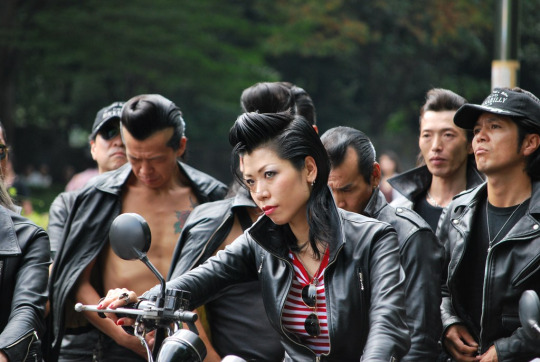
Chicano culture in Japan
Chicano culture present in Japan since the 1940s when the Mexican and Latin American people started to live in Japan. Early immigrants came to Yokohama and other cities and lived in ethnic groups. They married Japanese women and had families. In the 1960s and 1970s, more Latin American migrant workers came to Japan because of the good economy.
They also lived in the same ethnic groups as the earlier immigrants. The Chicano community in Japan grew bigger. Nowadays, Chicanos in Japan have their businesses, cultural organizations, and media outlets. They are a lively and busy community.
Chicano Art in Japan

Source: Flickr Images
Chicano art is based on the Chicano Movement during the 1960s, and influenced by Latin American culture. The main specialty of Chicano art is colorful murals. Sometimes they are used to give political statements. So they gained popularity in Japan for their message through art form.
Japanese artists and art lovers have embraced the Chicano art movement, incorporating its themes and techniques. Galleries in Japan frequently host exhibitions inspired by Chicano art, highlighting the talent of artists from both cultures.
Chicano Music and Dance in Japan
1. Mexican Music Fusion
Mexican Music is most famous worldwide so it has an influence on Japanese culture. In Japan, Chicano culture has influenced music and Japanese people adopted music with their own music. Bands and musicians have been inspired by Chicano and Mexican music. The most popular genres in Japan are mariachi and conjunto. They combine traditional Mexican sounds with Japanese musical elements.

mariachi
2. Dance and Folklore
Chicano folk dances, such as "Baile Folklorico," have become part of Japan's culture. Dance groups perform these traditional Mexican dances, wearing vibrant costumes, at festivals and events throughout the country. This shows how Chicano culture's rhythmic and lively expression has a universal appeal.
why is Chicano culture big in Japan
The Chicano culture of Mexico has a lot of diversity and has evolved since the 1960s. It represents the diverse experiences and identities of Mexican Americans. It includes different forms of language like Spanglish or Caló.
The literature of Chicano culture also evolved in Japan such as Chicano or Chicanx literature, art forms like muralism, or lowrider culture.
Lowrider Culture

lowrider
Lowrider culture became famous not only in Japan but also in the USA and South Korea. Actually, Lowriders are cars that have been customized according to the young generation's demand. It became very famous in the youth.
It is a symbol of pride for the youth and express their identity. Lowrider car clubs remain a part of Chicano culture and have since expanded internationally.
Chicano Food and Cuisine in Japan
Food in the Chicano culture has its own identity. Not only in Mexico and the USA, Chicano foods are famous in Japan. For example, Tacos is the most famous street food worldwide.
Tacos Food is a symbol of Mexican-American culture. Not only Tacos, but Burritos are also the most famous food among the Japanese from Chicano culture. Chicano foods are a reflection of the rich and complex history of Mexican-Americans. They represent the blending of cultures, the celebration of heritage.
Read the full article
0 notes
Text
The Christianity that eventually emerged from the tradition of Paul, Augustine, Anselm and Aquinas had strong Judaic elements. It spoke of faith, hope, charity, righteousness, love, forgiveness, the dignity of the human person and the sanctity of life. It valued humility and compassion. It spoke of a God who loves his creatures. But it also contained strands that were undeniably Greek and in striking contrast with the way Jews read the Hebrew Bible. The following are some of them.
The first and most obvious is universality. Judaism is a principled and unusual combination of universality and particularity: the universality of God, and the particularity of the ways in which we relate to God. The God of Israel is the God of all humanity, but the religion of Israel is not, and is not intented to be, the religion of all humanity. You do not have to be part of the Sinai covenant, or even the covenant of Abraham, to reach heaven and achieve salvation.
Pauline Christianity rejected this. The upside of this is its inclusivity, expressed most famously in Paul’s striking statement, ‘There is neither Jew nor Gentile, neither slave nor free, nor is there male and female’ (Galatians 3:28). The downside is its denial of any other route of salvation. Extra ecclesiam non est salus: ‘Outside the Church there is no salvation.’ Universality is supremely characteristic of Greek thought in the classic age between the sixth and third pre-Christian centuries (though of course it was not applied in their religious understanding). Above all it is the legacy of Plato, who utterly devalued particulars in favour of the universal form of all things. For Plato truth is universal and eternal or it is not truth at all. In that sense, Paul and Plato are soulmates.
The second is dualism. To a far greater extent that Judaism, Christianity after Paul develops a series of dualisms, between body and soul, the physical and the spiritual, earth and heaven, this life and the next, with the emphasis on the second of each pair. The body, says Paul in Romans, is recalcitrant. ‘What I want to do I do not do, but what I hate I do’ (Romans 7:15). There is nothing like this in Jewish literature. To be sure there is the ‘evil inclination’, but no suggestion that because of our embodied condition we are slaves to sin. The entire set of contrasts — soul as against body, the afterlife as against this life — is massively Greek with much debt to Plato and traces of Gnosticism. Paul’s occasionally ambivalent remarks about sexuality and marriage also have no counterpart in mainstream Judaism.
Third is the Pauline reinterpretation, one of the most radical in the history of religion, of the story of Adam and Eve and ‘the Fall’, and the consequent tragic view of the human condition. There is no such interpretation of the passage in the Hebrew Bible. According to Judaism we are not destined to sin. In the very next chapter, before Cain murders his brother Abel, God reminds him of his essential freedom: ‘Sin is crouching at your door; it desires to have you, but you can dominate it’ (Genesis 4:7). The collective forgiveness of humankind occurs, in the Hebrew Bible, after the Flood. ‘Never again,’ says God, ‘will I curse the ground because of humans, even though every inclination of the human heart is evil from childhood’ (Genesis 8:21).
The human tragedy as described by Paul is more Greek than Jewish, and as for the idea of inherited sin, it is already negated in the sixth pre-Christian century by both Jeremiah and Ezekiel. Of course, in Christianity, tragedy is avoided by salvation: but salvation in this sense, the existential delivrance of the human person from the grip of sin, does not exist in Judaism. We choose. Sometimes we choose wrongly. We atone (in biblical times through the Temple service, post-biblically by repentance) and God forgives.
Fourth is the potential for the separation, unknown in Judaism, between ‘faith’ and ‘works’. In Judaism the two go hand in hand, Faithfulness is a matter of how you behave, not what your believe. Believing and doing are part of a single continuum, and both are a measure of a living relationship characterised by loyalty. In general one of the great differences between classical Greek and Hebraic thought thought is the immense emphasis in the latter on the will. We are, on a Jewish view, what we choose to be, and it is in the realm of choice, decision and action that the religious drama takes place. The Greek view emphasises far more the role of fate and the futility of fighting against it. Under its influence Christianity became more a religion of acceptance than protest — the characteristic stance of the Hebrew prophets.
The fifth and most profound difference lies in the way the two traditions understood the key phrase in which God identifies himself to Moses at the burning bush. ‘Who are you? asks Moses. God replies, cryptically, Ehyeh asher ehyeh. This was translated into Greek as ego eimi ho on, and into Latin as ego sum qui sum, meaning ‘I am who I am’ or ‘I am he who is’. The early and medieval Christian theologians all understood the phrase to be speaking about ontology, the metaphysical nature of God’s existence. It meant that he was ‘Being-itself, timeless, immutable, incorporeal, understood as the subsiding act of all existing’. Augustine defines God as that which does not change and cannot change. Aquinas, continuing the same tradition, reads the Exodus formula as saying that God is ‘true being, that is being that is eternal, immutable, simple, self-sufficient, and the cause and principal of every creature’.
But this is the God of Aristotle and the philosophers, not the God of Abraham and the prophets. Ehyeh asher ehyeh means none of these things. It means ‘I will be what, where, or how I will be’. The essential element of the phrase is the dimension omitted by all the early Christian translations, namely the future tense. God is defining himself as the Lord of history who is about to intervene in an unprecedented way to liberate a group of slaves from the mightiest empire of the ancient world and lead them on a journey towards liberty. Already in the eleventh century, reacting against the neo-Aristotelianisn that he saw creeping into Judaism, Judah Halevi made the point that God introduces himself at the beginning of the Ten Commandments not as God who created heaven and earth, but by saying, ‘I am the Lord your God, who brought you out of Egypt, out of the land of slavery.’
Far from being timeless and immutable, God in the Hebrew Bible is active, engaged, in constant dialogue with his people, calling, urging, warning, challenging and forgiving. When Malachi says in the name of God, ‘I the Lord do not change’ (Malachi 3:6), he is not speaking about his essence as pure being, the unmoved mover, but about his moral commitments. God keeps his promises even when his children break theirs. What does not change about God are the covenants he makes with Noah, Abraham and the Israelites at Sinai.
So remote is the God of pure being — the legacy of Plato and Aristotle, that the distance is bridged in Christianity by a figure that has no counterpart in Judaism, the Son of God, a person who is both human and divine. In Judaism we are all both human and divine, dust of the earth yet breathing God’s breath and bearing God’s image. These are profoundly different theologies.
— Rabbi Lord Jonathan Sacks zt”l, in The Great Partnership: God, Science and the Search for Meaning
176 notes
·
View notes
Text
Mahito and Todo

Gionshōja no kane no koe, Shogyōmujō no hibiki ari. Sarasōju no hana no iro, Jōshahissui no kotowari wo arawasu. Ogoreru mono mo hisashikarazu, tada haru no yo no yume no gotoshi. Takeki mono mo tsui ni wa horobin(u), hitoeni kaze no mae no chiri ni onaji.
The sound of the Gion Shōja bells echoes the impermanence of all things; the color of the sāla flowers reveals the truth that the prosperous must decline. The proud do not endure, they are like a dream on a spring night; the mighty fall at last, they are as dust before the wind.
Todo is quoting the Tale of the Heike, one of the most famous stories in japanese literature. The central theme of the story is the Buddhist law of impermanence, specifically in the form of the fleeting nature of fortune. It’s remarking on the transitory nature of life. In other words, nothing is permanent.
However, Todo only quotes the first part of the text. However, we are the exception! Is something Todo added. Not only is he altering a classical text which has implications of arrogance in a cultural context, Todo is also turning the quote around entirely to say that even if everything in the world is fading, his friendship with Yuji will never fade.
All of this to say, that Todo and Mahito’s philosophies towards life are complete opposites. Mahito represents the inevitability of decay, which is why his touch destroys whereas Todo insists he is stronger than that decay, then that inevitability, and arrogant enough to fight against it. More on their character foiling under the cut.
1. Life Circles
The 4-character expression (yojijukugo) "the prosperous must decline" (盛者必衰, jōshahissui) is a phrase from the Humane King Sutra, in full "The prosperous inevitably decline, the full inevitably empty" (盛者必衰、実者必虚, jōsha hissui, jissha hikkyo).
Mahito as a character is someone very observant of natural law, and the nature of the world around him. His closest friends are all literally made to be embodiments of nature as cursed spirits.
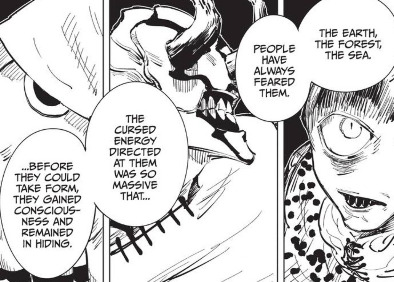
The budhist law of impernanence is another natural law, remarking that with time everything fades. Eventually everything in this world will die. LIfe is fleeting, etc. etc. Mahito as a character has a special understanding of both the composition of the soul and the body. He can see through it in a way that others can’t.
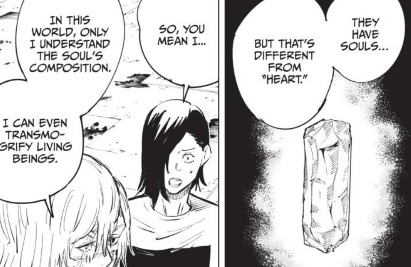


However, his ability to see the soul causes him to dismiss it as nothing special. It is just another part of life. Mahito as a character observes and compeltely obeys both natural law and his nature. He is a curse. He’s there to curse people. He does that to his fullest ability. To Mahito life circles around. It cycles. Everything living must inevitably die, and because of that there’s really no point in attaching meaning to something imperanent.

Mahito just sees it as something that goes in circles. He doesn’t see the soul as anything special. Humans and curses both have souls, so they’re completely equal in his eyes. Human awareness, reason, logic, emotions, values, connections, doesn’t add anything to it, because Mahito can’t see them therefore it’s all made up. Mahito’s argument towards life then becomes very nihilistic.
Everything is the same in his eyes. Mahito can twist a human form to a fat, bulbous monster, but he still sees it as a human because there’s a human soul dwelling inside of it. Mahito rejects the idea that any of these things, human reason, human emotions, give any sort of value to life.

Mahito is inherently nihilistic, at least in the sense of moral nihilism. There is no meaning to life, therefore it gives me liscense to do whatever I want. He doesn’t have any respect for life in the slightest. Everything is fleeted to Mahito, so he’s completely without respect, and without sentiment, because to Mahito there is no point in getting invested in something that is inevitably going to die anyway.
Mahito is the embodiment of the fear of other human beings. Therefore it only makes sense, that he denies connection. Humans have no connection to one another, and no conenction to the world around them, they’re just there. It’s inherently nihilistic statement, because he’s arguing basically there’s no meaning to existence.
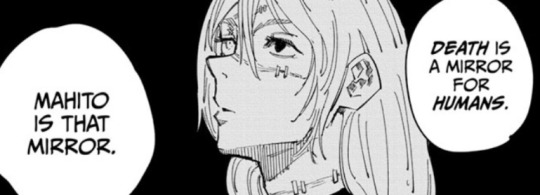
Jogo even calls Mahito the embodiment of death because he reflects that idea so well, that everything dies. Even Mahito’s own curse ability is the embodiment of his inability to connect, if he reaches out and touches someone he only harms them with just a single touch of his hand. Hands are pretty basic symbols of human connections.
However, even though Mahito’s nihilistic he’s not indifferent. He outright hates, and torments other humans. He encourages Junpei to hate life, exactly like he does.
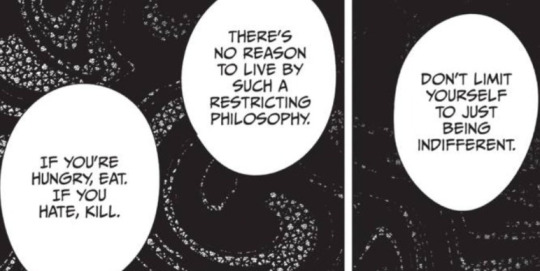
2. We Exist
If Mahito is a character that hates life, antagonizes life, then Todo is the complete opposite of that. Todo is someone who represents love and connection. Hence why even down to his curse energy takes the form of little hearts.
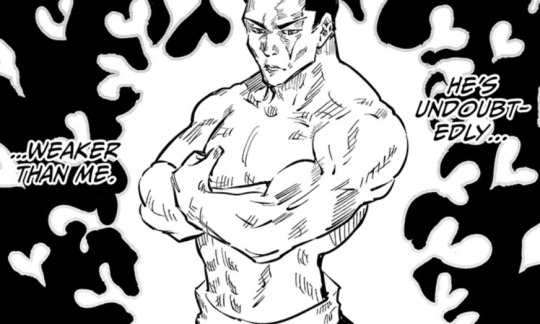
Every detail we know about Aoi, centers around this idea of love, and particularly this love of life. The hearts are a repeating motif with him, they even appear on his volume cover. We know he has a crush on an idol named Takada.
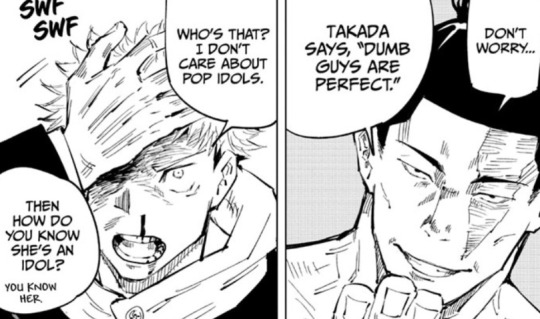
The first question he always asks people when he meets them is what kind of girl do they like, (but even if it’s a guy who is only into other guys he finds that answer acceptable as well).
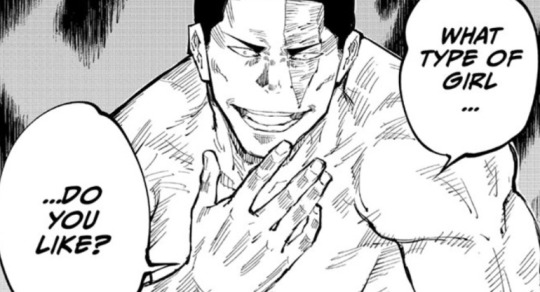
He dismisses Megumi from the moment he meets him, but immediately falls head over heels for Yuji. However, look at the difference between Yuji and Megumi. Megumi is someone who feigns indifference, and pretends not to be invested in the life around him. He’s always repressing his emotions and pretending he’s not interested. Yuji on the other hand, loves life, loves other people, and will react to save people’s lives without even thinking. Megumi is principled, but Yuji is unprincipled and acts on a simple love for the people around him, so therefore it makes sense why he’s more Todo’s type.

The only other person Todo seems to respect on the level of Yuji is Okkotsu Yuta, who also said this. Whose cursed technique was converting the girl he loved into a cursed spirit to remain with him after her death.

If Mahito’s character is built around the hatred humans have for each other, Todo is built around love. Even if it’s kind of in a weird way sometimes. He asks people what kind of girls they love. He respects people who are open about what they love. This isn’t even the first time that Love and curses have been connected thematically to each other in the series.

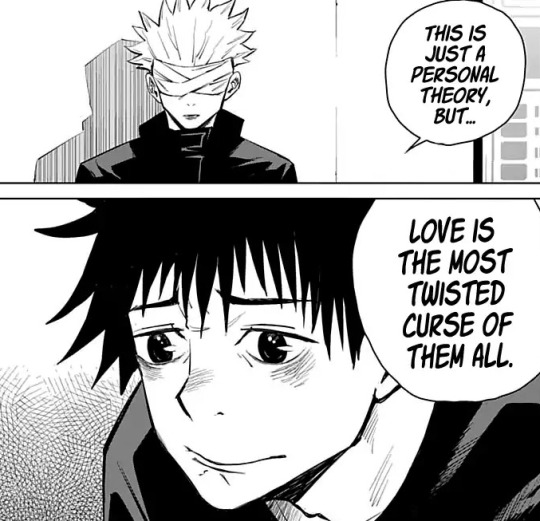
Love and curses are presented as a complementary pair. That is rather than being binary opposites ,like life and death, fire and whater, they’re like yin and yang. Two ideas that seem like opposites but go together. Love can be like a curse. You can curse someone you love. Etc. etc.
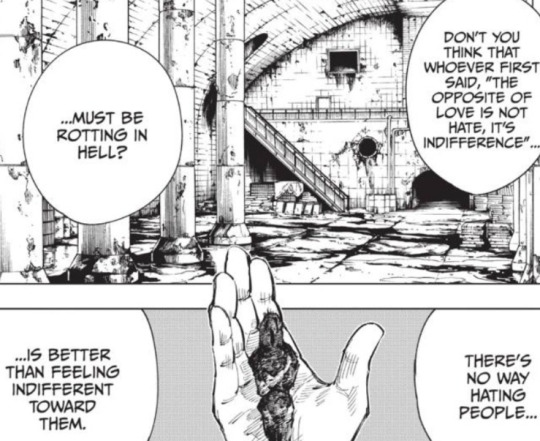
Love and hate, is much like love and cursing, seem like they’re opposite ideas. They’re traditionally held to be opposites. Mahito even comments on this. There’s Junpei who is apathetic. Mahito says the true opposite of love is hate, and saying apathy is the opposite is just japanese wordplay. He then encourages Junpei to hate people, to curse them. Mahito is a cursed spirit, hating people, cursing people is in his nature.
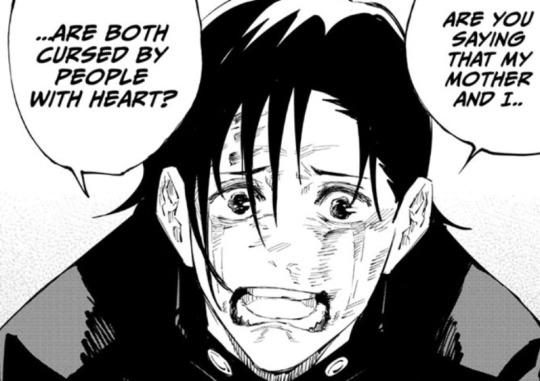
Junpei even said, the hatred that the bullies constantly lobbed against him, the fact that his mother was killed, it all felt like he was being cursed by everyone around him. Cursing people, hating people, are presented as the same thing to Mahito.
Mahito’s philosophy is basically that there’s no particular meaning to existence, therefore it’s okay to hate life.
Both Mahito and Todo have a special insight to how cursed energy flows around him. Todo as weird as he is, seems like the wisest of all the students especially in regards to curse energy.
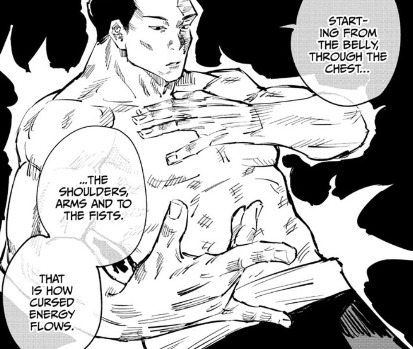
Todo has a similiar perspective of the world as Todo. He too says that life, that cursed energy flows through the world. However, rather than using that argument for nihilism, he uses it for existentialism. Mahito says we don’t exist that there’s nothing special for existence. Todo says we do exist. Therefore it’s okay to love life.


While Mahito encourages Junpei to hate and spite others, Todo does the opposite of that, telling Todo to repress his hatred for now, because he has to think of the feelings and well being of the people he loves and is trying to protect first.

Todo is someone who fights against the natural order of things, for the sake of the love he feels for other people. He even literally fights Hanami, who is an embodiment of nature.

Hanami, the practice of watching the blooming sakura flowers is also a symbol of transience. Todo fights against this transience, and declares himself the exception. Mahito is natural order, Todo opposes natural order. Therefore in both love and hate, and also in philosophy they are complete opposites. Todo fights for what he loves, and Mahito fights for the sake of hating others.
Even in thie cursed techniques they are opposites. They both use their hands. However, Boogie Woogie is a cursed technique ideally suited for cooperation. When he claps his hands together he switches places with anything. Todo is like, the one sorcerer in the series whose cursed technique is far better for team fights than it is solo fights.
Mahito calls for them to curse each other.
Todo, blows a little kiss when he’s fighting against Mahito, another symbol of love.
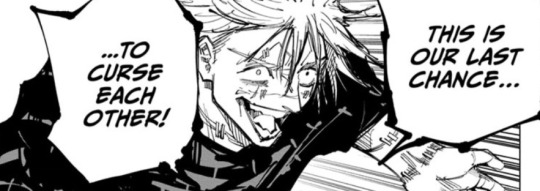

(Mahito’s Let’s curse each other, is also a callback to Geto’s let’s curse each other. Geto is someone who after all, hates humans as well, at least the ones who aren’t jujutsu sorcerers).

When Mahito shows Yuji he is all alone by killing two of his allies Nobara and Nanami (Nobara is fine though), Todo shows Yuji that they are still all together because he is carrying the feelings of his allies with him. Something Mahito would insist means nothing. Something Todo says means everything.

Lastly, when Mahito moves to finish off Todo he’s distracted for a moment by Todo’s little locket. The symbol of his love for both Yuji and Takada.

Which buys Todo enough time to clap Mahito’s hand and used his cursed technique even after one of his own hands is completely blown off. Hands are the symbol of connection, Todo connects to others and Mahito doesn’t.

What’s ultimately ironic is the memories Todo has are completely fake. They are made up. Just like Mahito says, there is no meaning to life, any kind of meaning we try to make is just made up. However, even though Todo’s friendship with Yuji is completely imaginary, he obviously values it. His fake friendship with Yuji trumps Mahito who really only values his own individuality, and only thinks about himself.
Mahito says I am the only thing that’s real, therefore it’s only natural I only care about myself.
Todo says, my friendship is Yuji is real, and our feelings will far outlast both of us.
#todo aoi#aoi todo#mahito#yuji itadori#itadori yuji#jujutsu kaisen meta#jujutsu kaisen#jujutsu kaisen theory#jjk meta#cursed spirit#cursed technique
472 notes
·
View notes
Text
On Words and Meaning
So I've been thinking a lot about how Loki is being discussed and the words used, particularly by Hiddleston, given his bent for using literary language in his descriptions. There are three words I want to touch on in this little post, one of them definitely rooted in his usage.
So the first I want to touch on is the term "romance." We've heard (often from Hiddleston), that Loki is, at heart, a romance. I think there's a dimension of the discussion missing in these conversations in that is important to consider.
To the layman, a romance is simply a love story, sometimes with a sexual undertone. But in the literary sense, a romance is a much deeper genre. I want to consider that this layer may also be present in Hiddleston's intent on using the term in describing the story arc. It certainly is in mine, as someone with a fascination with literary form and also with an English degree who has spent way too much time exploring genre.
So firstly, we need to define "romance." From literaryterms.net:
I. What is Romance?
In the strictest academic terms, a romance is a narrative genre in literature that involves a mysterious, adventurous, or spiritual story line where the focus is on a quest that involves bravery and strong values, not always a love interest. However, modern definitions of romance also include stories that have a relationship issue as the main focus.
II. Examples of Romance
In the academic sense, an example of a romance is a story in which the main character is a hero who must conquer various challenges as part of a quest. Each challenge could be its own story and can be taken out of the overall story without harming the plot.
Example 1
A knight who wishes to prove himself by recovering a stolen heirloom from an enemy may find himself attempting to make his way through a dangerous wood filled with thieves.
Once he has accomplished this challenge, he may find himself climbing a tall mountain on which a group of people are in trouble. He would save the group somehow, and then move on.
Then the final stage: the enemy’s kingdom. There may be a fair maiden whom he meets and somehow helps or rescues, or perhaps she helps him.
But the fair maiden is not the focus of the story – his quest is the focus. Each story can be taken out, yet each builds the hero’s strength to face his final quest. These stories tend to be serious rather than humorous and touch on strong values.
In considering this, I've thought about Loki's arc as a quest that does, indeed, involve the discovery and exploration of strong values with a three part quest, though I don't think the quests entirely stand on their own. The overarching theme is about Loki discovering his sense of self- his quest to become a full person, not just a trope for the universe to exploit so others can reach their better selves. I divide the show up in to three quests. The first, in episodes 1 and 2, is Loki finding a sense of purpose in the new world- his quest is to discover who this new variant is and where they are hiding. This is resolved by the end of that second episode. The second arc takes place in the next two episodes- Loki discovering his empathy for others is the continuation of the overarching personal development plot, while his quest is to discover Sylvie's goals and to uncover/share the truth behind the TVA. And in our third section, episodes 5 and 6, we get the culmination of the personal growth arc in his ultimate discovery of different facets of himself (illuminated by the different elements of self shown in the multitude of variant Lokis) while the quest is to uncover who is in control of the Sacred Timeline and why. The differences in colour palettes, settings, tones, etc. between the three episode pairings is a part of how I started to distinguish my thoughts on each. And regardless of the visual distinctions, I most definitely see the entire arc as exploring strong values and bravery, though the bravery is multi-layered, showing not only the visible bravery of facing down an apocalypse, Alioth, etc., but the internal bravery of challenging one's self and digging deep into discovering who one really is. This is a theme of queerness that I see lingering in this series- discovering who we are is a process, not an outcome.
I think that this definition of a romance, in the classical sense, is a little oversimplified, as there is often a theme of discovery of self or improvement of self along the way. In a Gothic romance, themes of "the people are the real monsters" come into play (Crimson Peak is an excellent example of this)- there may be elements of the supernatural, but the real thing of which the viewer/reader should be afraid is the person behind the curtain. Gothic romances also often do include a love story arc, but it is often deeply flawed on some level and often also includes some sort of sexual or romantic awakening, often by a female lead, that leads to the discovery of whatever darker is taking place (Crimson Peak turns this on its head in that it is Thomas' awakening with Edith that leads to his turning point and Edith's realization that the Sharpe siblings are the monsters, not the ghosts in the hall). The themes of discovery of self, or of the fortitude of moral values, or of the journey of a person's development, play into both a Gothic romance and its foundations in a classical romance.
So. There's part 1 of this ramble.
On to part 2!
The next word I want to examine is the term "relationship" and its companion, "love." Now, mind you, I come at this from a queer perspective as a demisexual, demiromantic individual, so these two words are ones I've spent a LOT of time pondering, in the quest to define my own identity.
We've heard the term "relationship" tossed around so often with only a romantic implication attached, but in truth, this word is so much more broad than this. You are in a relationship with your barber. You are in a relationship with your cat. You are in a relationship with a spiritual advisor, a professor, your best friend, your partner. Just because it is so heavily used in this way doesn't mean the relationship is only an intimate one (though intimate relationships are also not inherently sexual or romantic in nature, either, so let's remember this as well). Now if we break down what a relationship is, it's just a consistent interaction with someone based on some common interest or goal. It's a remarkably benign word. Its connotations, however, take it in a multitude of directions.
So let's look at it through the lens of an intimate relationship and add in the component of love. We'll start with just a blanket statement that love is not only one single thing. It isn't just romantic. It is our family, our friends, our pets, pie, the colour blue, that feeling of perfection when the waves of a warm lake brush over your calves...love is embedded in the experiences of these things. We love them. Love it as vast and broad as relationships. We love places, people, things, and experiences. We love ourselves (or we try to learn to).
In my world, through my particular brand of queerness, love changes in intimate relationships on a regular basis. I love my partner dearly. But on some days, that love is to my best friend, while other days, it is a romantic love and on others, sexual expression may be involved, but they may overlap in different ways. Sexual expression is independent of romantic attraction and the degree of each isn't tied together in any way. If we can separate these things, I think we can see the relationships in our everyday lives in different lights and with greater complexity.
I also think that looking at these things through the lens of diverse sexual and romantic experiences can inform how we interpret the Loki x Sylvie pairing and why some of us just aren't bothered by it (though certainly not the only reason people aren't).
We've been told Loki loves Sylvie. That much is beautifully clear. But love (and being in a relationship) doesn't automatically mean that 1) both parties are experiencing it in the same way, 2) both parties have the same approach or priorities, 3) the level of romance is necessarily the same between the people involved, 4) that sexual attraction exists at all.
Sometimes a kiss is a form of communication and not tied to the want to shag someone.
So this is where my interpretation of this particular pairing comes into play. I do see the story as a romance, in the classical sense, but also with a slight streak of the more modern sense involved. The focus is still on the quest, even when the love story emerges. And that is where I see the priorities of these characters and their definitions of the relationship differing and I analyze it through these different dimensions of love and relationship orientations.
Loki actually embodies one of the traits I've seen listed for demisexuals- we hold our friendships extremely close and because we hold our friendships the way we do, it isn't uncommon for us to end up with crushes on our best friends (and no, they don't generally develop into other forms of relationships, but they could). This is the phase in which I see Loki by episode 6. He has formed this intense bond, unlike any other it seems he's had, and his heart is breaking over the thought of losing her to her own rage. All he wants is for her to be OK, remember? This isn't a selfish action. But I think it is significant that while he tries to stop her, he's not the one who initiates the kiss. All his actions here are ones that a close friend would also do for their best friend. Like, I'd try to stop my besties from inadvertently destroying the universe. I'd even throw down over it. And for the exact same reasons- the risks are too great, we need to think, and I want them to be OK. Almost everything Loki does throughout his growing closeness to Sylvie is something I'd do for one of the people I've told I'd defend- as in, I literally told some of these people, "anybody messes with you, I'll cut a bitch- just tell me who and I'm there."
So because of all this, I don't see this relationship as sexual in any way. Romantic? Possibly. But not necessarily. Even being in love with one another doesn't mean a relationship has to have a sexual component.
Looking at Sylvie, I see her also as having found companionship with Loki, but her overriding goal is, ultimately, not to bond with someone- it's her mission. And she has sacrificed her entire life because of the TVA to this mission. She tells him repeatedly, in one way or another, that the mission comes first. Yes, she does care about him, but I don't think the way she cares about him is the same as the way he cares about her because they have differing priorities and needs (and hence why she feels betrayed by him when he tries to stop her). Or at least she hasn't allowed herself to express that. When she falls to the ground after she's killed He Who Remains, I think we get a glimpse of what Loki meant to her- she is alone, she grieves, and there is no meaning left to her story. She's done what she dedicated her entire life to and the person who could have given it other meaning is no longer beside her.
I still don't think that the first thing they would do upon seeing each other is suck face and have wild sex. Would that bother me? No, not really. I can headcanon something different than what actually happens, I'm fine with that (just look at all this glorious headcanoning happening right here!) I'd like it to stay a romantic friendship (queer platonic relationships for the win- they're squishes!) because I don't think we hardly ever see those types of relationships and queer platonic relationships are incredibly beautiful and powerful and yes, based on love and maybe even romance, in their own way. They are defined by the people in them, as are all relationships.
And now to address "but she kissed him!"
Yes, she did. And I've kissed my partner when there wasn't romance involved because I wanted to share a moment, to express something deeper than I had words for (yes, even on one of my aromantic leaning days), or just because it's fun. And it doesn't have to "match" up with how the other partner feels it, either, so long as the message itself is what comes across. This is how I read the Sylvie x Loki kiss. It was a message of worthiness. Loki's entire arc, including in that scene, is in discovering if he's anyone different than the monster he's made himself out to be (and encouraged others to see him as). He tells Sylvie that he can't be trusted, falling back on the habit of characterizing himself as the professional liar, the one who can't form those attachments which are built on trust. He also identifies her as someone incapable of trust in that moment, which I think is also a projection of how he sees himself. He tells Mobius he can only trust himself and the show slowly shows Loki coming to trust others, but in this moment in the Citadel, he's falling back on a different perception of himself.
This is where the kiss comes in, for me. Sylvie isn't trying to tell him she'd jump him right then and there, if things were different. Sylvie is trying to tell him that she does trust him, that he can be trusted, and that he is worthy of the affection of a friend, even if she can't have him in her way. She is prioritizing her mission, yes, but not without giving him some sort of reassurance, in her own way, that this rejection isn't personal. That he isn't too broken to be loved. It doesn't have to go into romance (not saying it couldn't, just saying it isn't a requirement). It doesn't have to go into sexual relationship territory.
Maybe I see this so vastly differently because of my experiences exploring gender, sexuality, and romantic orientation. Maybe I see this so differently because at this stage in my life, I would absolutely kiss a friend if I felt something so heavy was going to break them. I have a friend I say "I love you" to every time we talk on the phone or video chat- we've been together for 20 years. I've got photo proof of a snuggle pile of friends when I was a young adult. I've shared a bed with a friend with no reason other than that we didn't want to sleep on the floor and why not. I've had friendships that were awkward to start and intense once they got going that are absolutely still important in my life. I've had crushes on friends that have faded and just shown me another dimension of what it is to love someone. I've watched adults who struggle to make connections to other people discover those moments of awkward "how do I do friend mode?" and come out stronger for them, with that huge sense of victory hidden behind a small smile they don't want to share with anyone else quite yet.
I see so much possibility in how we interpret a television show reduced to "it's a romance and that's sick and incest and he wants to fuck himself!" and it just saddens me that so many people have such a limited understanding and experience of the depth and breadth of human relationships and of how people love one another.
18 notes
·
View notes
Text
The secret meeting at Hospital H
THH ... How intriguing this book is for theorists like me. We have a library with a lot of information. We have the revelation about the SB theft. And we have the information that a person loved by Lemony died in a terrible fire on afternoon. Or at least that's what Lemony believed at the time he wrote THH.
Let me reignite the flames of one of asoue's main controversies a little, and I would say one of the most important: Is Lemony Snicket a reliable narrator?
Well, surprisingly we have Daniel Handler's confirmation that Lemony is not a reliable narrator. This is very important information from the author himself.
However, this leaves theorists with more problems than solutions. If Lemony is unreliable, does that mean he lies on purpose? And before I think the answer to that is yes or no, I can say that the most sensible answer (without making an assessment of the text itself, but of the statement) is that it is not necessarily so.
Let me cite an example of Brazilian literature in a book called Dom Casmurro. The narrator is the main character. He categorically states that his wife betrayed him. It provides evidence that for it sufficient, but an attentive reader will soon realize that the evidence presented are not conclusive, and all can be explained as misunderstandings. But the question is: did she betray him or not? The answer is that it can not be sure, and that was what the author wanted. To this day people argue about it, and no one has achieved a definitive answer, despite the statister's statements. The narrator is unreliable, not because he wants to fool the reader, but because he makes statements that they simply are not necessarily true even though he believing them.
Now let's think about Lemony Snicket. The main argument that serves as evidence that Lemony is an unreliable narrator is that he sometimes contradicts himself. After all, either Beatrice died one morning, or she died one afternoon, or she didn't even die. Either Kit Snicket died on the island during the time when the Buadelaires children were there, or she was alive at the time of the publication of the books. But if we take into account the evidence that Lemony spent years writing his books, there is a possibility that these contradictions are caused by Lemony's access to new information, which led him to complete other things as he published his books. The fact that he contradicts himself only underscores the value he gave to the truth: when he himself realized that he had been wrong in some detail, he was not ashamed to clarify some details. We can say that, based on this logic, when Lemony wrote THH, he believed that Beatrice had died on a different occasion from the fire in her house. Although this statement itself cannot be substantiated, due to the unreliable nature of the narrator (who may be mistaken again regarding Beatrice's death) it does mean that Lemony had access to information that made him believe that Beatrice survived the fire from her house.
(Of course the credibility of these possible information can also be contested). Still, it's good to ask ourselves, "Why did Lemony change his mind?"
We can say that there are two canonical moments that can indicate the reasons why Lemony changed her opinion. One of these reasons I have always defended, and I will not dwell here: The masquerade ball at which Lemony was captured took place after the publication of TRR. And TRR was published years after the main events described in asoue. Whether Beatrice was actually there or not is a good question, after all it may have been a scheme to attract and capture Lemony.(better than a costume party to disguise yourself as someone else).
But still we have proof that Lemony believed that Beatrice could have survived for many years after the fire at her house.
But, while he was writing THH, he believed that Beatrice had died at some point after that, at some time when a suspicious typewriter was involved (as indicated in the three-part art that describes what happened to Beatrice).
The other and canonical evidence is the list of patients in the form of anagrams contained in THH. I always believed that the names on this list were fourth wall breaks. As Dante said, it would be unlikely that a great disaster in Vfd make several people involved with VFD go to the same hospital at the same time. This convinced me at the time. But then, Roxy222 , in a game, created a more interesting theory. The list of patients containing Lemony Snicket Anagrams, Beatrice Baudelaire, Daniel Handler, Lisa Brown and others should not in fact be a list of true patients. According to Roxy, VFD must have marked some secret meeting at the hospital that day, and the list of patients would actually be a list of people present for that meeting.
It makes a lot of sense. Hospital H had a library linked to VFD. Information related to VFD arrived in physical media, which indicates that someone personally took it there. Due to the confidential nature of these messages (not even Hal could read them in detail) it is to be expected that the messengers were people connected to VFD or animals connected to VFD. It is not difficult to imagine the hospital as a meeting place.
Second, there would be no reason for Count Olaf to simply write all those anagrams there. It is quite possible that when he went to write Violet Baudelaire's anagram he simply came across a list of anagrams with names of his enemies. He easily deduced that his enemies were around. Although he did not deduce the names of each one, it was easy to see that those were anagrams of someone from VFD, and so he deduced that it could be some of his enemies. This certainly served as an additional motivation for Olaf to start a fire in that hospital.
Third, there is my theory about how Lemony knew about events in detail, including secret Baudelaire meetings. Klaus and Sunny decoded their sister's anagram in a room where only the two of them were. Klaus disregarded anagrams that could not have been Violet's. However, Lemony knows the names of these anagrams. Although Klaus has an incredible memory, I think it is unlikely that he would write these names in the island book, on which Lemony based a good part of his writings according to my theory. That list must have been destroyed in the fire. So the information about the contents of the other names on the list must be something that Lemony Snicket himself already knew. This is evidence that he was indeed there, that day, and that is why his name was there, in the form of an anagram, on that list.
This is evidence that Lemony did believe that Beatrice had survived her house fire when he published TRR. (Although he started writing TBB before the fire at Hospital H, although he probably published it years later, as indicated in TBBRE).
35 notes
·
View notes
Text
Literature between Political Correctness and Cancel Culture
(Analyzed through Walter Siti, Natalie Wynn and Rick DuFer.)
(buckle up, because if you're gonna read this, it's gonna be long)
«Today is much easier to mistake an author’s personal stances with the content of their works, and then make the author pay for the work’s sins.
Today I look around and I have the sensation that literature is no longer taken seriously: that the way to interpret literature the way I knew it, depth-focused, focused on the power of words to reveal truths otherwise concealed to their own author, is disappearing — substituted by a conception of literature that has to serve a list of good causes.
When some writers of the “neo-effort” (Siti’s neologism) insist on the fact that words are decisive, and that it’d be urgent to change the words in order to change reality, I’m suddenly reminded of those old Marxist authors: they explained that the structure, which is what lays under society, determines what lays upon it, that is words and ideology. Thus, changing the name of something doesn’t change the thing the word stands for at all.
Literature has been considered throughout time the most indicated form to make resurface the part of ourselves — often, the least pleasant — that we’ve exiled in the shadows of our subconscious: a process that often happens without the author’s acknowledgement of it.
The authors of the neo-effort believe they have the duty to spread their ideas to the largest possible number of people and that, in order to do so, they have to simplify as much as they can what they write, sacrificing on the altar of efficiency the style, considered useless. The aim is to do good, namely gain an effect, what does it matter if it’s good or bad literature? Literature used to “take root”, to influence; put at the service of pre-established ideas, and not to venture into the discovery of something we don’t know yet. This way, it gains an ancillary role. And it’s a humiliation of literature — which can truly be useful, instead, only then it hurts.
Sartre’s “Nausea” doesn’t align with his political stances. For Sartre, the effort was the individual reflection of a society in perennial revolution, substantially a school of liberty, whilst for neo-effort the role of literature is to reassure.
Their attitude, their rejection of style, their low consideration of literature, tends to isolate the good writers out there, marginalizing them in a niche that looks like a convention of obsessed aesthetes in the public’s eyes.
I see it in the writing courses I teach: more and more young people whose main interest isn’t to write to learn something about themselves or society, but it’s to write to gain the title of writer and place themselves on the market, detecting the most profitable sector at the moment, which might be fantasy, crime, or effort-centred writing: it doesn’t matter, what matters is for it to be trending and to be reassuring to the reader, in a more and more therapeutic conception of writing.
Literature isn’t immediately therapeutic, this is the difference. When “The Sorrows of Young Werther” was published, copies of this book were burnt, because of the suicides it inspired. Today we read it at school. How much time has passed? I don’t refuse knowledge’s benefit, I refuse that knowledge can benefit instantly, painlessly. When I went to a psychoanalyst to face my neurosis, the psychoanalyst made me suffer for months, and only after I took benefit from it. What would have happened if they had welcomed me with a pat on the back and said “Don’t worry, stop thinking and go help African children”. Probably I would have had an immediate benefit, but all my neurosis would have stayed there, intact.
The Literature I talked to you about is depth-centred, and literature hasn’t always existed: thus it can disappear, sink for many years. Who said that it’ll survive, despite everything?
In Pasolini’s trial he was acquitted because Ungaretti was called to testify. He wrote a letter where he wrote that the formal value of Pasolini’s work turned into literature even those scenes that the prosecution deemed obscene. Law couldn’t do anything but recognize the critical judgement and welcome it. Web’s tribunal, today, would have burned Pasolini at the stake, and Ungaretti with him.» (via Walter Siti’s interview with the Huffingtonpost)
In other words, we can summarize Siti’s view with the sentence «novels aren’t the cure to the world’s evils.» They aren’t, because they don’t have the power to be, and more so they aren’t even supposed to be: writing is a form of art, and art has primarily an end in itself. Literature isn’t a political marketplace, even if it can be used to be — it’s not a crime to turn it into one, but by doing so, one loses Literature’s nature. By doing so, the harm could be mistake literature’s primary aim (that is being a form of art, that is style, that is the pursuit of the truth) with what they turned literature into: a marketplace to defend the author’s ideology.
Siti’s powerful image of the Web’s tribunal, the Web’s court finds an echo in Natalie Wynn video Canceling: in a sense, what Siti calls “neo-effort writers” fall under the same line of thoughts of Cancel Culture perpetrators.
«Like the guillotine, [cancelling] can become a sadistic entertainment spectacle.
Now there's a version of this conversation that's already been had to death, and it goes like this: On the one side are a bunch of male comedians who constantly bitch about how Cancel Culture is out of control, you can't joke about anything anymore without these Millennial jackals trying to get you in trouble.
And the other side is mostly progressive think-piece authors who argue that there's no such thing as cancel culture, it's just that powerful people are finally being held accountable for their actions and they can't fucking handle it, so they go around bitching about cancel culture.
Now unfortunately, neither of those viewpoints is quite as correct as some people might hope.
What Cancel Culture does, [is to] take one story and transform it into a significantly different story.
Presumption of Guilt
There's a traditional understanding of justice according to which, before you condemn or punish a person, you hear the accuser's side of the story and the accused's side of the story. You allow both sides to present evidence and only after everyone involved has had a chance to make their case do you pass judgment and punish the convict.
But cancelling does not abide by the law. Cancelling is a form of vigilante mob justice. And a lot of times, an accusation is proof enough.
Abstraction
Abstraction replaces the specific, concrete details of a claim with a more generic statement.
Essentialism
Essentialism is when we go from criticizing a person's actions to criticizing the person themselves. We're not just saying they did bad things. We’re saying they’re a bad person.
Pseudo-Moralism or Pseudo-Intellectualism
Moralism or intellectualism provide a phony pretext for the call-out. You can pretend you just want an apology; you can pretend you're just a “concerned citizen” who wants the person to improve. You can pretend you're simply offering up criticism, when what you're really doing is attacking a person's career and reputation out of spite, envy, revenge.
No Forgiveness
Cancelers will often dismiss an apology as insincere, no matter how convincingly written or delivered. And of course, an insincere apology is further proof of what a Machiavellian psychopath you really are.
Now sometimes, a good apology will calm things down for a while. But the next time there's a scandal, the original accusation will be raised again as if you never apologized.
The Transitive Property of Cancellation
Cancellation is infectious. If you associate with a cancelled person, the cancellation rubs off. It's like gonorrhoea, except doxycycline won't save you this time sweetie.» (via Natalie Wynn's Canceling video transcript)
Natalie Wynn describes and formalizes the phenomenon of Cancel Culture in those steps:
I only listen to the presumed victim,
I abstract the context to a vague idea,
I equate the action to the actor’s very essence (as if such thing even existed),
I say I’m acting in favour of morals or truth,
I accuse every person the presumed abuser ever came in contact with to be an abuser as well,
and I either reject every form of apology at the moment, or bring up the issue as if no apology was ever made at their first misstep.
Now, in this post I’m not trying to perpetrate any concept of charity, not only because it’s an attitude that takes a lot of work to inherit, but also because the negative aspects that might bring one to be a neo-effort writer or a Cancel Culture perpetrator are part of the very human nature (or, very stupidly, they wouldn’t be humans.)
The self-evidence rises here: those negative parts of human nature can be channelled everywhere, and literature or any other form of art is the healthiest way to do so: you’re not going to get rid of your anger, or your sadness — the best thing you can do is learn to control it and suppress it, but how is it going to work in the long run? It’s going to act past your good judgement, or even cloud your good judgement, clouding it into thinking you’re defending some pseudo-moralism or pseudo-intellectualism, when what you’ll be doing is just venting on someone else.
This is one way to see it: when one forgets what proper thinking is and falls into those quick and gut-feeling “thoughts”. Or one could even take advantage of this Cancel Culture, of this ground of poor thinking to instrumentalize this lack of critical judgement to attack someone else.
On instrumentalization and its dangers, Rick DuFer says:
«Political correctness works when its aim is to protect the weak from abusers, but when it favours every little susceptible sensitivity it turns dangerous.» (via Rick DuFer’s podcast DailyCogito)
Rick DuFer talks about a shared responsibility that happens during offence: shared between the offender and the offended. The problem with offence, as opposed to harm, is that it isn’t quantifiable, so the offender is guilty in regard to their intentions, and the offended is guilty in regard to the instrumentalization they can enact with the situation.
And again we find “instrumentalization”: if one destroys my property, I can quantify the damage, but if one insults me, how can I quantify how offended I truly am? This is when I can twist one person’s words and turn them into an offender, this is when sensitivity becomes a mask and no longer a virtue (or, for the toxic masculinity’s thought, a vice.)
Now, to wrap things up:
These people take the (s)word of this school of thought (which some other dichotomists may, generalizing it, call it “Strong Thought” or “Unique Thought”), perhaps without even knowing there’s an alternative, while there are multiple, actually: as many as the human beings right now populating Earth.
They may do it out of a dualistic and very childish view of society — divided into good and bad people. And if that’s your view of life, you’re not gonna want to be associated with who others deem as bad, following a gut feeling and nothing more. (And I say “gut feeling” to avoid saying “very poor thinking”, because that’s what absolutization, essentialism, and the rest is.)
Your thoughts aren’t really yours, and you become a vessel for something that belongs to someone else, someone who crafted those thoughts in a very different context, or with instrumentalization in mind. You don’t want to risk criticizing those thoughts because you don’t want to be isolated, or because you’re a sane person who deems it important to act rightfully (even if you’re letting others tell you what “right” is.)
And for how problematic moral relativism is, it surely is better than any form of absolutization: better than rejecting your status as “sapiens” and stopping thinking altogether, passively accepting what others taught you to be right and wrong, maybe even out of fear, or a stupid rush for glory and sympathy.
So I wouldn’t call this moral relativism, strictly, but rather moral subjectivism, or context-centred morality. A morality in which people still have a brain to separate a piece of work from an author’s ideology (against essentialism) and to still take into account the context in which an action was performed (against abstraction). A morality in which “good” and “wrong” aren’t seen in black and whites, but rather into lighter and darker greys; a morality which systematic use can slowly dress into the habit of charity towards one another, into kind teaching rather than cruel instrumentalization.
And is it really utopistic, is it really unfeasible, if we’re not falsely annihilating the suffering and the negative parts of the Human Experience?
This whole discourse could be turned into a political marketplace of rights and lefts, of conservatives and progressivists — but my aim here is much smaller (or bigger, if one is a humanist): to make the reader question their critical thinking, and just that.
(We love some self-doubt.)
I believe moral acts aren’t supposed to be a badge to share on one’s vest — to renew your status as “approachable person” (as if saying “don’t worry, you can talk to me, you’re not going to be deemed as bad for it”) or to be praised for. Moral acts are the only acts that raise humans from other species, the acts where the “sapiens” shows its evolution, the acts where our negative aspects aren’t hidden but channelled into arts, without the fear that someone might call us bad for it. (Immoral, even, whilst acting in the most moral way possible, exorcising those negative parts of us in the least harmful way possible.)
So, at the end of this unnecessary rant, my question is: is it better to be a minion in a culture where you have to watch your mouth, as if it wasn’t yours, or to be a person who’s engaged in researching how right and wrong truly manifest?
#the first and last sources are in italian#i did my best translating them#rant#philosophy#literature#cancel culture#cancelled#politically correct#controversial#opinion#thoughts#very open to discuss civilly
14 notes
·
View notes
Text
“…Bertran is explicit – nothing in his view is of more value for a man (because, of course, this is all very gender-specific) than personal, direct martial valor. “No man is worth a thing / till he has given and gotten blow on blow” is a pretty direct statement (note that it is fairly clear from the rest of Bertran’s oeuvre that this extends to a snobby disdain for peasants and non-nobles whose occupation is not fighting). Elsewhere in his songs, Bertran declares “A young man who doesn’t feed on war soon becomes fat and rotten.” This is, of course, a striking view because of how different it is from our own – we generally expect the experience of combat to harm a person, whereas Bertran sees it as wholesome; stick a pin in that for now, we’ll come back to it in a moment.
The sort of martial valor that Bertran is interested in is also fundamentally personal valor. The laying of plans, creation of stratagems, the ordering of men, the motivation of the common soldiers – exactly the sort of tasks that occupy most ancient military manuals (including not just the Mediterranean tradition, but also the Chinese one) – don’t figure in at all. Of course those sorts of concerns were part of the training and culture of the aristocracy of the period (and other period sources bring them out better, though surely not to the degree as classical literature – there is a great deal of difference in the sorts of leadership different societies expect), but they are decidedly secondary. The only leadership Bertran’s ideal lord does is to lead other aristocrats by example in being the first to charge and attacking with reckless aggression.
It is also very much a specific form of valor: that of the armored, mounted aristocratic warrior. The common soldiery – the infantry – exist in Bertran only as targets and victims, and even then not very often! This is a deceptive pattern in medieval European literature: despite the continued presence (and indeed, often importance) of common infantry, the aristocrats who write to us tend to focus on the valor of the cavalrymen (which is to say, the valor of themselves) to the exclusion of the foot soldiers (a pattern which tend leads to atrophy in the infantry arm in many cases, for an overview see Lee, Waging War, ch. 5). For a sense of exactly what that battle experience might be like, I think Hergrim’s battle vignette on Reddit is quite good.
But inside of that specific framework, Bertran is quite clear: he thinks war is good, both that it improves a man, but also that it is simply a positive experience. How much of this is bravado? Some of it might be – it is politically and socially useful for Bertran to advertise his own attachment to war. Both because this is a way for him to drive a strong case in rallying his fellow aristocrats to go to war, but also because he lives in a society where martial valor is a source of uncomplicated positive social value. By advertising his devotion to war, Bertran is also essentially saying ‘I am unafraid, the meanest fellow in the room’ in company that very much values strength and fearlessness. But that stance only works if Bertran’s audience agrees on the first principle that the experience of war improves a person.
Now, you might be asking ‘how can Bertran think that?’ And, given that battle is supposed to be the formative experience for all of these aristocratic young men, how are there any left? Bertran cannot be in ignorance, after all, and we’ve already discussed why it is unlikely that he is simply painting a false portrait of a reality both he and his audience know far better than we do. And therein lies a number of our answers.
Let’s start with the second question – how are there any aristocrats left? By the 12th century, it isn’t because of massive promotion from outside; the ranks of the aristocracy are in the process of ossifying, with new entrants becoming rarer and rarer in much of Europe. Rather, what seems to be the case is that, for people like Bertran, the chance of dying in all of that war remained relatively low. In the first case, the style of warfare of the 12th century, oriented around raids and sieges, with relatively few large set-battles and relatively smaller armies – tended towards lower casualties in comparison to the warfare of other eras. See
...At the same time, it seems fairly clear that most of the dying that was happening wasn’t generally being done by the mounted aristocracy. It is easy to miss because the big exceptions like Courtrai (1302), Crecy (1346) or Agincourt (1415) stick so firmly in the mind, but these are both later than Bertran (during a period of significant military change that made such upsets more likely) but also notably by their exceptional nature. Looking at the lives of medieval aristocrats, it is hard not to notice that – compared to say, the Lost Generation – they tend to live a fairly long time despite their constant warfare.
Bertran himself, despite fighting almost continuously throughout his adult life survived to retire to a monastery in 1196 (probably in his fifties, age-wise). Now, to a degree, this may well be survivors bias – the aristocratic young men who weren’t very good at it and thus died in early adulthood do not cut memorable figures in our history. But the 12th century Occitan aristocracy was not limitless in size – this was a period where the European military aristocracies were increasingly closed to new entrants (and that aristocracy was never very large in absolute terms). And the degree to which high casualty events among the aristocracy remained shocking aberrations (events on a scale that would have been normal and unremarkable for antiquity or the early modern period) suggest that casualty rates among the mounted aristocrats probably did remain relatively low.
And it’s not hard to imagine why: these men were the best trained fellows on the battlefield, but more to the point, they were the best armored and also the most able to retreat if the battle went badly. Not only because they were on horses (but also because of that), but also because, for the men in the upper aristocracy, they had retinues of their own (less noble) fighting men arrayed around them. If the battle went badly, chances are the fellows being butchered in the retreat are the ones on foot. While infantry was written out from not only Bertran’s poems, but much of the literature of his day, it was still the infantry that did most of the dying in war.
Consequently, the idea that ‘war builds character’ is a lot easier to sustain if the sort of warfare a society (or in this case, a class within a society) engages in produces relatively low casualty rates over time. Now, I want to be clear that the word ‘relatively’ is carrying a lot of water in that sentence: these wars, while relatively lower casualty affairs are by no means bloodless, even for the aristocrats, armored on their equine-escape-pods. But the experience is radically different from WWI – which I keep returning to because it shapes our current discourse on the effects of war so strongly – where France saw 16% of its total deployed manpower killed (and another c. 50% wounded) in a four year period.
So while Bertran’s song is an expression of the values of his class, those values are in turn shaped by what the experience of war was like for that class. One imagines the commoners whose villages and towns were about to be plundered had different songs; agricultural raiding and devastation was a key part of the sort of warfare Bertran participated in (it shows up at points in his songs – in Miez sirventes vueilh far dels reis amdos he sings gleefully that once war begins, “never a mule-driver will travel the roads in safety, nor a burgher without fear, nor a merchant coming from France”).”
- Bret Devereaux, “A Trip Through Bertran de Born (Martial Values in the 12th Century Occitan Nobility).”
6 notes
·
View notes
Photo

The Sufi Quest
by Ustad Hilmi, Mevlevi
MAN, we say we know, originates from far away; so far, indeed, that in speaking of his origin, such phrases as ‘beyond the stars’ are frequently employed. Man is estranged from his origins. Some of his feelings (but not all of them) are slight indicators of this. This is why we speak of ‘separation from the beloved’; but these are technical terms, and those who employ them to increase their emotional life are — increasing their emotional life.
Man has the opportunity of returning to his origin. He has forgotten this. He is, in fact, ‘asleep’ to the reality.
Sufism is designed as the means to help awaken man to the realization, not just the opinion, of the above statements. Those who waken are able to return, to start ‘the journey’ while also living this present life in all its fullness. Traditions about monasticism and isolation are reflections of short-term processes of training or development, monstrously misunderstood and grotesquely elaborated to provide refuges for those who want to stay asleep.
However improbable all this seems, it happens to be true. It is, of course, no less probable than many other things believed by man. Some such beliefs are certainly erroneous: we all know individuals with beliefs which we are convinced are erroneous. On the other hand, since Sufism depends upon effectiveness, not belief, Sufis are not concerned with inculcating and maintaining belief. ‘I believe this is true’ is no substitute for ‘This is how it is done.’ The two things are in reality, if not in appearance, poles apart.
If man finds himself again, he will be able to increase his existence infinitely. If he does not, he may dwindle to vanishing-point. Those who see a threat or promise in such a statement are unsuitable for this work. There is no threat or promise in facts: only in the interpretation man makes of them.
People have been sent, from time to time, to try to serve man and save him from the ‘blindness’ and ‘sleep’ (which today would be better described as ‘amnesia’) which is always described in our technical literature as a local disease. These people are always in touch with the Origin, and they bring the ‘medicine’ which is half the cure. The other half, as in orthodox terrestrial medicine, is the activity of that which is acted upon, to attain its own regeneration with the minimum of aid. These cosmic doctors — a literal translation of a most ancient term — often live in the world almost unnoticed, like the camel in the desert. They have been of all races, and they have belonged to all faiths.
Essentially, religion has two roles, which in all surviving systems have become confused through the absence of specialist knowledge in the publicists and most visible and active theoreticians. The first is to organize man in a safe, just and peaceful manner, to establish and help maintain communities. The second is the inward aspect, which leads people from the outward stabilization to the performance which awakens them and helps to make them permanent.
Numerous residual systems for human progress continue to float around in the world, but virtually all are devoid of value in this inner aspect, though they may not be without historical interest. Certainly they can show us at a glance that they are only employed for personal and community sentimental satisfactions — whatever their own imaginings about the matter may be. They can most charitably be described as vehicles abandoned by their builders and now occupied by half-comprehending amateurs who seek only a relief from thought about their predicament.
‘The Teaching’, however, operated by those whom we call ‘The Wise’, continues and may take any form. It is preserved intact and constantly nurtured by certain Sufis. Well-meaning but imitative groupings based on Sufism, and of no value to this inner side of ‘the Work’ exist side by side with real ones.
Recognizing a ‘True Master’ is possible only when the postulant, man or woman, is what we call ‘sincere’. This technical term refers to his condition, not his opinions. Sincere means that he is objective enough to recognize the specialist and the nature of the task. To reach this stage, the Seeker has to learn to set aside, at least for a time, superficial assessment about the teachers, the Teaching and himself. By superficial we mean something quite precise: automatic assumptions based upon rules employed in testing a different type of phenomenon.
Thinkers of the East
1 note
·
View note
Text
Trustee Supervisors
Pension Trustee Advisors
Content
Mental Wellness Officer Standing In The 2015 Nhs Pension Scheme.
Taking Early Retirement.
Why End Up Being A Pension System Trustee.

Individuals's Pension Trustee is in charge of running the plan and for looking after all the pots of money held by the scheme. Included on 30 Might 2012, the Trustee Board is composed of the complying with individuals. You may be directly liable for any loss triggered to the scheme if something goes wrong. a plan that has the result of preventing an area 75 financial obligation from setting off-- for instance, 'desertion' of the system. To find out more, including good technique examples, see our support on winding up. Occasionally plan events will certainly cause the need to provide information - for example, specific details should be sent when a system begins to wind up or members are being moved to one more system without their approval. You also need to supply details to people on other events either immediately or if they request it-- for instance, when a member retires, dies or leaves the plan.
pension trustee Bristol ='text-align:center'>
youtube
An example of a scheme-related event is two or even more modifications to the article of scheme actuary or auditor within twelve month. other details that we reasonably need to carry out our duties, for instance, to assess the threats for every system. propositions to switch from a salary-related system to a money-purchase system, or vice versa. The code of technique MNT/MND - placing arangementsin area and support on MNTs and MNDstells you much more. If Pensions alexandria best practices or a court fines you as a result of a breach, you can neither pay the fine out of the scheme's properties neither utilize the plan's assets to pay the premiums for a plan insuring you versus penalties.
Psychological Health Policeman Standing In The 2015 Nhs Pension System.
We use cookies to guarantee you have the very best experience on our site. The research study covered four topical styles-- communications & engagement, worth for participants, education and learning & suggestions as well as responsible financial investment. MiPB cloud accountingUnderstand your organization performance with the support of professionals. These cookies are used to allow certain performance on our site such as personalisation. This website utilizes cookies to boost your experience while you navigate via the website.
Can ex wife claim my pension years after divorce?
The Canada Pension Plan (CPP) contributions you and your spouse or common-law partner made during the time you lived together can be equally divided after a divorce or separation. This is called credit splitting.
pensions are one of the most popular terms used in the United Kingdom. A pension is actually a fund from which a fixed amount of money is contributed during the employee's employment years, and from which monthly payments are subsequently drawn to support the former person's retirement in the form of fixed salaries. These payments are generally obtained from the employer, although the former employee may also claim payments from their employer in certain circumstances. Typically, the employer contributes a portion of the former employee's pension at retirement, with the remaining portion going to the employee.
Taking Early Retirement.
If the statement is adverse or certified, the scheme auditor need to offer reasons. A power of amendment will usually lay out just how an arrangement of the scheme can be modified. It is great technique to unite the changes into a single replacement record at least every 5 years.
Still No Resolution For North Chicago Police Pensioners Told To Work As Dispatchers Or Lose Their Benefits - CBS Chicago
Still No Resolution For North Chicago Police Pensioners Told To Work As Dispatchers Or Lose Their Benefits.
Posted: Sat, 16 Jan 2021 00:28:00 GMT [source]
You ought to also upgrade any kind of literature issued to participants at the same time, to maintain consistency in the details offered concerning the system. Our code of practice - Inner controls- offers sensible guidelines concerning taking into location, maintaining and also running inner controls for your plan. specific loan arrangements with 3rd parties which entail the employer. No choice to make an investment needs to be made without initial obtaining and thinking about the correct suggestions. making certain that the scheme properties are spent generally in regulated markets.
Why Become A Pension Scheme Trustee.
The concept of pensions is not limited to any specific age. In fact, it is often possible for people to reach retirement age without having contributed anything to any pension funds. Often, employers will choose to offer a company match up to a certain amount, ensuring that the employee receives the full monthly income they would receive had they been eligible to receive pension benefits.
On top of that, costs subtracted for the transfer are unlikely to be recouped.
PMI Pulse aims to gather the sights of the pension plans industry to evaluate the state of mind as well as state of the pensions sector gradually.
Even more info is readily available on thethe Pensions Regulator web site.
HMRC might bill over half the value of your pension for taking an 'unsanctioned repayment 'from your pension legal rights by doing this.
The violation of count on might be unintended, or it may be caused by neglect or through illegal and also unethical practices. You must adhere to the procedures laid out in the trust act and rules when considering whether to utilize an optional power. As an example, the guidelines may require you to look for medical guidance before reaching a decision on whether to permit a member to retire early on ill-health grounds. Problems of rate of interest is a legally complicated location as well as lawful recommendations need to be sought and also conflicts took care of. The Pensions Regulator has to provide codes of technique about certain demands of the Pensions Act 2004, as well as may provide other codes if it wishes. The codes consist of functional advice on exactly how to comply with the requirements in question, and laid out the criteria The Pensions Regulator expects. This guidance matches our Trustee toolkit, laying out helpful information with links to relevant support on our website, which those that have completed the toolkit will find useful.
Pension Assistant.
There are several types of pensions available in the United Kingdom. Some of these include: life pensions, defined benefit (DB) pensions, and insurance-based pensions. Life pensions are those that provide a fixed amount of money to a beneficiary who will use it for different purposes, such as medical expenses or tuition fees. Defined benefit (DB) pensions provide a set level of income to the former employee who has retired from work, and no additional benefits will be paid out to the employee upon retirement. Insurance-based pensions, on the other hand, do not guarantee any kind of income to the former employee upon retirement; instead, the insurance company pays out a monthly amount to the former employee upon retirement.
Pensions are a popular choice for many employees because it allows them to maintain the same standard of living that they had while working for their employer. Unfortunately, employers have a legal obligation to contribute a certain amount of money to each of their employees' pension plans. The contribution of the employer is based on an employee's performance, age, and the length of the employee's service with the employer. The younger the employee is when he or she retires, the lesser the amount of the pension that the employee will receive upon retirement. Pensions are also subject to retirement expenses, which are pre-paid expenses that the employer will have to pay for after the retirement of the pensioner.
Michael has an MBA from the City University Service Institution in London, and a Masters in economics from the University of Louvain. We do this with utmost sincerity and also sincerity-- always remembering that it's your cash, your life as well as your business. office pensionfor your workers will certainly provide the best feasible returns for you as well as your staff members.
Pritzker to decide COLA increase for Chicago firefighter pensions, with $850M price tag - Illinois Policy
Pritzker to decide COLA increase for Chicago firefighter pensions, with $850M price tag.
Posted: Sat, 16 Jan 2021 00:57:33 GMT [source]
The principal sorts of professional consultants, and their roles, are described listed below. Our code of method - Coverage breaches of the law- tells you a lot more.
execute their work competently and also in accordance with your policy for selecting financial investments, as laid out in the declaration of financial investment principles. Among your most important obligations is to see to it that the appropriate cash is paid right into the plan at the right time. Our guidance on the auditor's statement as well as audited accounts offers more info on these requirements.
We intend to cover the PMI whole syllabus, making use of sample concerns of the kind used in PMI examinations to encourage interaction as well as discussion, and to bring out the underlying problems. The program includes a full simulated exam, as well as completed with a private test resting overseen by a PMI invigilator. We have actually run this program for many years as well as have a success price of around 98%. We champion and also promote entrepreneurship, concentrating our energy and also know-how on aspirational and growing businesses, helping owners elevate the capital they require to sustain their passions.
#pension trustee eu#pension trustee europe#pensions and divorce eu#pensions and divorce europe#trusted pensions eu#trusted pensions europe
1 note
·
View note
Text
Memories in Red
When a dream has gone on for too long, the thin membrane between reality and the clouded world of the mind may be broken, leaving the dreamer submerged in the dark void of their own subconscious. Another dream has come and went, even as it proves to be darker and more unpleasant than the last, I miss it dearly.
I awake to this padded room once again rattled, only to recollect that I am indeed crazy, spats of lucidity grace my presence as if pleading me to write out this memoir of sorts. This very well may be the only way I can gain a grip back into reality, or more likely, drive myself deeper into the thick fog that is consuming my mind. In this conscious state, I recollect only that of less importance unto myself; age, occupation, or even my damn name remains a mystery. But of what I know, I did have a life before my spiral into the abyss of insanity. A wife that dips into my memories only to taunt me with her mysterious beauty, a pocket watch that meant some special importance in my life, a dog, and a grotesque bastard child. You see, I was sent here of my own accord, I did not want to be locked up with the ingrates of the penal system, I felt better suited to be one with the shit eaters and comatose rotted vegetables that also live within the walls of this sanitarium. In here, bound up like mummified corpses, the fear isn’t of those around us, it is of what is inside yourself. I chose this route because of an urge that set upon me long ago, this urge is only one of the multiple memories that alludes me every time I find myself sitting on the edge of reality looking back into the grim horrors that clouds my true subconscious.
The bloody cuts across my hands and fingers are the only real source of entertainment here, it seems my writing has been going on for quite some time judging by the amount of scribble on the walls, red patches, and smears correlate into a jumbled mess of words directed only towards myself. These words scrolled out reveal portions of my life that I may have wanted to remember, or possibly forget. Judging by the writing on the walls, I must have been busy the past few days, so many words and phrases give way to more conclusive statements. “Children under god” and “remember” plastered in bright red imagery above the cell door, followed by multiple occurrences of the name “Virgil”.
In this place, time holds value higher than any currency, it is not easily retrieved, and the lack of a clock or workers doesn’t help the issue one bit. Thought my memories are few and far between, I don’t recall any staff member gracing me with their presence in a long time, I don’t know how long I have gone without human interaction, let alone food and water. Looking at my poor excuse for a body it seems like I haven’t indulged in sustenance in quite a long time, each rib visible as the last, a pale, bony chest leading to shoulders that have no fat left on them. My shadow being cast by the single white florescent bulb that hangs in the middle of my padded hovel looks like the creatures that haunt me late at night, I laugh, trying to convince myself that these nightly visits are all in my head, but the scars tell otherwise. I say this because being in a padded room meant for a mentally unhinged patient as myself, there is no tool for me to tear into my own flesh, no knife or piece of glass, gifting myself the sweet release of red ink that I so desperately crave. No, I get these wounds by another force, an unknown being in the shadows, the corners of my cell representing the shackles of my mind that won’t let me free. Sometimes it comes in the form of my wife, nameless and transparent she takes my arms, lifting them up and giving them the lightest kiss before slashing with her sharp claw-like nails, as I look up from the blood into her dark eyes, the calmness turns to fear as she opens her gaping mouth to reveal a black darkness that wants to swallow me whole. This vision of horror only to be set back by rapping on my padded door, no one is there, no one is ever there. I recall waking from a state of mental unsightliness to observe a black dog with bright yellow eyes peering at me from that damned corner of the room, growling and grimacing to show every razor-sharp fang only to leap onto me. I have heard the dreaded sound of tearing flesh too many times in my life, the beings that lurk in this room with me want me to write, they want to be heard. I am tired now, without the value of time at my disposal, the only thing telling me that night has come is when the power to the only light source in the room is shut off. It’s dark now and I must try to sleep.
As I am about to fall into a distant slumber, praying to not being visited by whatever horrible entity of my wretched mind has in store, I hear screaming. This is not an abnormal occurrence in this place, but these screams are different. It sounds as if a child had gotten loose and is running through the halls churning their sorrows into an inconceivable volume not meant for human consumption, and the sound is growing closer to my room. Most of the time the wailing of the mad are my lullaby, whisking me off to a gentle sleep, but not this, it’s been getting closer and closer by the minute, inch by inch the louder it gets. Screams forcing their way through my ear drums and into my very soul. I try to cup my ears with my bloody palms but it’s no use, my eyes feel like they are going to burst only for the screaming to pass my door and stop suddenly. I release my grasp on my head and slowly slide myself to the door, I can’t hear anything, but I feel breathing on the other side as if taunting me, anxiety then hits my chest and I can’t breathe, my heart throbs and the blood smeared writing on the walls beats at the same rate. I fall on my back, looking up at the dark red literature on the walls, only getting brighter with every beat of my waning heart. I can’t hear anything, but I feel something watching me, laughing at me so menacingly that it tears at my insides and would rip my intestines out if gotten the chance. As quickly as I was brought back into my lucid like state, I was taken back again. I find myself at the threshold of sound mind mostly at night, which makes me ironically yearn for more sleep because within this realm of what we know as real, I am brought back into the pit of despair that only those that have experienced true hell will understand.
It’s been a few days now, and I must give myself a hand for the mural now sitting upon the wall adjacent to the door. A painting depicting only what I can convey as a child, sitting on a tricycle peddling towards a grove which is overlooked by a structure deep in the distance. It is disturbing to say the least, not only for the gruesome open-mouthed scowl rippled across the child’s face along with hideously dead eyes, but for the mere fact that it was completely created by the glorious red ink, what a waste. I must have been out cold for a while due to blood loss from the magnitude of my work, but after a while of sitting and staring it seems to calm me, a haven to place my mind when it turns inward on itself once again. I have never been the artistic type, but seeing the absolute scale and detail baffles me, this would be an immense feat to accomplish with a brush let alone a bloody finger. I search my entire brittle body to find an entry point or wound that could have saturated this wall the way it appears, but I find no new scars, my body is the way I left it.
As I sit and marvel at my work of art, I start to hear a sound, the squeaking of wheels ever so gently moving down the corridor outside my cell. I know how ignorant I must be, but the sense of anxiety and dread fill my chest cavity and I can’t take another second. I cannot be taken back again so soon, I must sit and write and keep my sanity just this once, but the wheels keep turning, bringing themselves closer to my room, all I can do is pray to whatever being is still out there for them to pass. Every second feels as if I am staring at the blade of the guillotine waiting for the rope to be cut, but as it creeps closer, the sound suddenly vanishes. I am in silence now, my body aches but I am still, knowing that something is out there waiting, staring directly into the cell, its breath hitting the widow with such force I hear it across the room. I cannot bring myself to peer out of the small dusty window on the door, for hiding whatever alludes me is the only way I can still survive here.
My visitor has yet to show itself, just viewing my quarters through a tiny glass pane, mocking me for my cowardliness to not step up and peer into the eyes of the unknown. I have convinced myself time and time again that there is a good reason I am in here, for I have the tendencies of a mad man, and inside these walls is the only place I belong. But this entity standing at my door may be my last hope of salvation, an utterance of good in a place stricken with evil. I have convinced myself to stand up and show my face to the staring one, and as I stand, the lonely light in the room flashes and burns out. Darkness hits my skin and chills me to my core, I cannot be trapped in here again, alone, pleading for light, the salvation to my pain-stricken mind. This mustn’t stop me, I must see my viewing party firsthand or forever be confined within the madness of the unknown. Every step to the door of my padded cell takes longer than the last, heart beating faster and faster, red ink on the walls flashing to the beat once again, illuminating my short path. I step up to the door, feeling the buildup of anxiety piercing my internal organs, wincing at the pain I look up at the cold, dusty, window. I look through to see nothing, just the source of blackness that has poured into the confines of my cell. But still, the breathing continues at a more advanced pace, this time it is not hitting the door, the hairs on the back of my neck raise as the hot rush of air pours onto me.
I clench my jaw tight, close my eyes, and stand facing the door hoping for whatever is behind me to leave my presence, but it does not go away. Instead, I feel the grip of a bony hand onto my shoulder, long nails cutting into my skin, I glance down slowly to see the hand that is grasping me is a woman’s, I can see her wedding ring digging into the finger leaving barely any skin, only pure white bone. I have an instant of clarity, realizing I know that hand from so long ago, I turn back quickly to view my visitor only to be greeted by my mural, only it’s changed. Bright red ink glowing so bright in the pitch blackness, showing off the same detailed landscape, the grove with an overlooking structure, but the child is gone, what is left is the bloody trail of something dragged off the bottom of the painting. Before I could even look over the whole mural, the light in the middle of the room bursts on, presenting the painting in its entirety in which the pure sight of it all brought me to my knees, hands pressed tightly against the sides of my head I couldn’t scream, nothing was left in me. In the picture, the bloody marks where the child once sat and rode his tricycle, lead out of the painting onto the ground where I knelt, and at the end of the trail laid the red coated tricycle laying sideways, wheel still spinning, squeaking ever so softly. I start to shake erratically, as my eyes move past the toy, onto a small body lying face down near my feet, bloodied and battered, the ink to my mural.
I know now what I have done to be in this place, I deserve to be here, in this wretched cell, dipping meaninglessly into insanity only to be brought back to face the reality of my cruel ways. As I stare at the lifeless corpse laying at my feet, it begins to move, and twitch in horrible ways I cannot even try to describe, he lifts his head by a weak neck, dark dead eyes lead down to a hideous scowl wrapped around a twisted face. I squirm, the dreaded feeling tearing away at my guilt-stricken insides consumes my whole body, leaving me motionless, not a single breath left in my lungs. I know that face, as horrid and decrepit as it may seem, whatever lay before me was my son, but now just another entity meant to bring me exactly what I deserve. Now all I have left to do is stare into the precipice of my own despair, waiting for this entity to consume me in the most dreadful way possible. We can never truly block out the pain, it will always be there, waiting to torment us until our last breath
#horror#writing#first piece#red#memories#death#insanity#lucidity#asylum#spooky#child#broken#technique#critique
8 notes
·
View notes
Text
TAFAKKUR: Part 175
Are Genes the Source of Behavioral Disorders?
We learn about a new gene everyday that is specifically associated with a certain human behavior or that causes a certain physical situation. One gene is responsible for crime, whereas another gene is the cause for baldness. This leads us to blame nature and physiology for these faults. Some recent findings, however, have proven that, contrary to popular perception, genetic expression is also regulated by a person's physical environment and its socio-cultural influences, thus human behavior is not just dictated by genetics. Genes, gene-dependent synthesized hormones, and culture are involved in the shaping of human nature. Behaviors appear in a set of motifs generated by both genetics and culture.
If we consider human nature as a book, the encoded information contained within, together with all the elements of inner and outer environments (bio-psycho-socio-cultural), becomes meaningful and functional. This is because each book has a visible structure composed of letters (semiotic DNA sequence) and a manifested meaning (semantic web) in a particular environment. From this point of view, genes should not be seen as mandatory codes, but should be considered as similar to the art of marbling (or ebru, which is the making of different patterns on a fluid by small vibrations of the ink droplets), for they are created by the united effect of various dynamic forces, and can only be understood accordingly. Human willpower and responsibility will also gain meaning and value when they are analyzed within the framework of the reaction intervals presented within the motifs of human nature which are shaped by the mutual effects genes and cultural factors have on each other. In this sense, human nature and culture should be evaluated together. We can organize the factors that determine human behavior and manners under three main titles - genetic, physicochemical environment, and psycho-socio-cultural factors. We can only speculate statistically as to how large or small a role each factor plays in development.
Behaviors like an inclination to crime, having intimate feelings for same sex individuals, cognitive and sensory sharpness, a desire for excitement and risk, or an inclination to addiction cannot be described by one or two genes. For instance, there are many factors (environment, genes) involved in acts of violence. However, one missing and insufficient factor can trigger violence. For instance, the Monoamine oxidase A enzyme is encoded by the MAO-A gene; this enzyme is in charge of degrading neurotransmitter molecules such as dopamine, serotonin, norepinephrine (these enable signaling between nerve cells). Depending on the mutations or polymorphisms of this gene, if the enzyme cannot function sufficiently, these individuals display an inclination towards violence and aggressive behavior. But if the person is aware of the situation and gets educational support from others, this behavior can be controlled.
Similarly, every person has a variable degree of genes that put them at risk for cancer. If these genes are activated via environmental factors - such as smoking, poor nutrition, mutagens, carcinogens - cancer may develop. On the other hand, if a person is lacking the cancer-causing genes or has low inclination towards cancer, such a person may not get cancer, even if he or she is a smoker. Similar statements can be made for genes associated with addictions, sexual perversions, and violent tendencies. More significantly, we can produce more value and meaning out of behavior-related genes when we evaluate them according to their context, position, and other factors, along with their relations to other genes. That is to say, there is a complicated network of factors that shape behavior. That’s why a DNA sequence alone cannot determine, all by itself, the development of emotions and manners, skills, and personality. In other words, phenotype can never be predicted 100% just by the interpretation of genetic information.
Brain and personality development is a multi-faceted, exposome mystery. From the start of pregnancy, especially throughout the preschool era, everything one is exposed to, and the way those events shape one’s nature, is called exposome. This can include subconscious events, for all sorts of personal history plays a role in such development. The connections of 1011 neuron cells that exist in an average human brain are not only determined by genes. Human DNA contains 6.2 x 109 nucleotide (letter), or information. Reading and using this raw information depends on many factors. Neurons can establish new connections via internal and external stimuli, while on the other hand, the number of neuron cells and connection networks can be changed by the neurochemical substances and hormones that they synthesize. All of the information required to define fine details in the motifs and connections of brain cells is not present in the genome. Mere environmental factors are not enough to complement this missing information.
Aside from these, many factors play a role in brain development and function. When the ends of axons and dendrites extend, they do so by recognizing nanomolecules that guide them all the way to the target organ or region. They happen to make minor changes and deviations during this extension. These changes are extreme enough that this extension is part deterministic and part trial and error. They reach the target through a statistically systemic algorithm but with a certainty less than 100%. Axons that are extended from eyes to the brain have a 1% possibility of taking a wrong turn at optic chiasm, and therefore not reaching the brain or arriving at the wrong region of it. However, there are also signalization systems built in our brains that recognize and correct these errors. If axons cannot receive the correct signals from target neurons, they get degraded. And sometimes a neuron of the axon terminates itself. These observations clearly show that brain development does not take place by a molecular program that is predetermined down to the minutest details but rather through a flexible program open to changes and errors.
This flexible program is explained by materialistic philosophy as “chance,” which basically means being in the right place at the right time to encounter the right factors. The same program, in religious literature, is explained by factors known as fate, kismet, destiny, divine blessing, and grant. Aside from that, there are also certain uncontrollable activations and a genetic background in the brain that are involved before we start a conscious action. From this perspective, motifs generated by biological and genetic inclinations set the infrastructure for the freedom of decision making and self-determination. Since our thoughts, emotions, and acts are formed within the neurogenetic and neurochemical construct of the brain, the motif that is created by the background here generates inclinations for specific acts and behaviors. In other words, events that take place in our brain chemistry during the fetal period and early childhood years are significant determinants of human development. The human brain can function in a state with willpower and consciousness, but can also function automatically, without consciousness. Briefly, it is through our genes that the framework of what we can achieve, our reaction intervals and threshold values are determined, and the possibility of an act is indicated. But the boundaries of the final decision are determined via statistical possibilities as a result of a person’s interaction with their environment. Therefore the boundary is not determined in a mandatory fashion, but via external dynamics (like manners, beliefs, or moral nourishment).
Human willpower is our capacity and strength to make free decisions and selections under the effects of spiritual, genetic, and environmental frameworks (endophenotype). The decisions and selections cannot take place independently from the sources nourishing one’s metaphysical world, cultural circles, or from the impact of neurochemicals in the brain and our hormones. “God burdens no soul except within its capacity” (2:286) is a sign of mercy and compassion from the Qur’an, indicating that the field of action and boundaries of the human willpower are determined based on multiple factors and wise causes. Producing customized religious rulings according to one’s natural strengths and weaknesses is also a very meaningful legal action in Islamic law. It is, in a sense, an acknowledgement that everyone has trials and experiences that are different than others’.
Humans have responsibilities within defined, limited conditions, and they can only make decisions within those permissible intervals of conditions and the constraints of their natural dispositions. If we can analyze human actions in a model that looks into their dispositions, cultural environments, genetic inclinations, and spiritual and moral nourishment, then we can attain better results in the education and character development of human beings.
Each factor mentioned above affects the child’s sexual separation and differentiation to various degrees. Misbehaviors during sexual development may emerge as a result of a complex mosaic of biological, psychological, sociocultural factors. There is not a complete consensus around the main reasons for this, yet each researcher favors one factor in the light of their expertise and ideological choices. However, objective observations and research point out that the quality of relationship between the parents and children is very influential in this matter. The display of unhealthy sexual inclinations stems from a negative background where there is not enough parent-child relationships to help the child develop. In families of children with strange sexual behaviors, a suppressive, excessively controlling model of mother and a distant, aggressive model of a father who resorts to violence are often found to exist. That is why many problems with intimacy and sex that occur later in life can be viewed as a developmental ailment and a problem of insufficient parental communication rather than a mandatory genetic phenomenon.
Various problems can arise when healthy differentiation and separation do not take place during a child’s development. A child, in the beginning, is like a part of the mother. If differentiated by detachment from the mother, and from her compassion and care, a child struggles to develop a healthy sense of ego. Such a child becomes inclined to develop a personality that is dependent, passive, and lacking sufficient confidence.
Research clearly states that each child is born with different inclinations and threshold values that are determined genetically and hormonally for each of his or her possible characters and behaviors. These potential inclinations and threshold values can surface depending on internal and external stimuli and educational styles. Even though both genders carry hormones belonging to each other naturally, during development one steps forward upon expression of encoded gender genes. When it comes to displaying sexual abnormalities, everybody is, genetically speaking, a dry log or a wet log. A dry log can easily catch fire, a wet one does not. However, it is the responsibility of society and parents to provide a spark-free environment for the dry log. Spiritual and biological nourishment during the developmental process are found to be significantly influential in diseases and aging, in disorders of character development, and in anomalies in sexual behaviors. When proper measures are taken timely, via suitable environments and educational modes, the possible surfacing of behavioral pathologies may be prevented or reduced for children potentially at risk. Through correct guidance and education, the expression and regulation of genes can be altered and managed, controlling these naturally present inclinations.
#allah#god#prophet#Muhammad#islam#muslim#muslimah#hijab#help#quran#ayah#hadith#sunnah#revert#convert#religion#reminder#dua#salah#pray#prayer#welcome to islam#how to convert to islam#new convert#new revert#new muslim#revert help#convert help#islam help#muslim help
1 note
·
View note
Note
Based on your response to the comment regarding the use of Althusserian concepts; would you say a revolutionary process necessarily involves conscious elements? And are there other concepts of the state that you prefer over the instrumental view of the state?
i guess my argument would be that, even outside of revolutionary scenarios, the traditional understanding of class tends emphasize consciousness in a peculiar (and moralistic way), which is to treat The Capitalists (bad guys) as extremely aware of what’s actually going on while The Workers (good guys) suffer from “false consciousness” (overstated in the secondary literature, compared to its relative non-existence in the primary sources. engels used the term like, Once). the problem then is about whipping up proletarian consciousness (often assumed to be somehow automatically revolutionary after that has been done) against the deliberate attempts by capital (understood here as a group of people) to obscure the realities of the system. althusser’s work is an elaboration on this view.
marx, however, had a completely different approach, which is to focus on the way that capital (now appropriately understood as an “automatic subject”, as a self-moving substance with its own logic) obscures itself. in the unfolding of capital’s categories, marx shows how the money-form covers the tracks of the law of value’s operation at a higher level of abstraction so that there appears to be a contradiction between the “theories” of value and money, when in reality the paradox is immanent to the system and not a matter of conflicting understandings (the common criticism that marx contradicts himself between value and money, value and price, etc stems from this confusion).
what this means is that the concepts are generative of multiple understandings of the concepts themselves, and that these appear contradictory so that these conceptions are often developed into one-sided theories of political economy. this is why marxs project takes the form of a genealogical critique of political economy, which requires interrogating the social forms in order to understand why they appear the way that they do, and why they, bearing the function of social mediation, determine our actions in such a way as to produce and reproduce everyday life, i.e. capitalism, thereby naturalizing it.
this involves an implicit theory of knowledge and necessarily has huge ramifications for how we can understand the development and limitation of class consciousness, because the object under investigation presents itself in a distorted manner. as marx says,
“Reflection on the forms of human life, hence also scientific analysis of those forms, takes a course directly opposite to their real development. Reflection begins post festum, and therefore with the results of the process of development ready to hand. The forms which stamp products as commodities and which are therefore the preliminary requirements for the circulation of commodities, already possess the fixed quality of natural forms of social life before man seeks to give an account, not of their historical character, for in his eyes they are immutable, but of their content and meaning. Consequently, it was solely the analysis of the prices of commodities which led to the determination of the magnitude of value, and solely the common expression of all commodities in money which led to the establishment of their character as values. It is however precisely this finished form of the world of commodities - the money form - which conceals the social character of private labour and the social relations between the individual workers, by making those relations appear as relations between material objects, instead of revealing them plainly. If I state that coats or boots stand in a relation to linen because the latter is the universal incarnation of abstract human labour, the absurdity of the statement is self-evident. Nevertheless, when the producers of coats and boots bring these commodities into a relation with linen, or with gold or silver (and this makes no difference here), as the universal equivalent, the relation between their own private labour and the collective labour of society appears to them in exactly this absurd form.
The categories of bourgeois economics consist precisely of forms of this kind. They are forms of thought which are socially valid, and therefore objective [my emphasis], for the relations of production belonging to this historically determined mode of social production, i.e. commodity production. The whole mystery of commodities, all the magic and necromancy that surrounds the products of labour on the basis of commodity production, vanishes therefore as soon as we come to other forms of production.” [v1: p168-9, penguin ed.]
all of this is to say that the existence of a class unconsciousness does not require a class of evil puppeteers working behind the scenes to obscure the real functioning of the capitalist mode of production; the system generates its own obscuration independently of social actors and, as marx says, involves “a social process that goes on behind the backs of the producers” [v1: p135], which also necessarily applies to the capitalists themselves. all of this is why fetishism is so important to marx, and runs throughout the 3 volumes of capital, explicitly reappearing at the end of v3 when marx tackles the trinity formula. it is only after this is explained that marx closes the chapter on “the revenue and its sources” [part 7 in engels’ edition, divided into smaller chapters] with what we now have as a fragment of the final “chapter” of the three volumes of capital: “classes”.
i dont think this ordering of the sections is an accident, as the elaboration on classes could only come after the clarification of the fetish-forms of the trinity formula, which necessarily complicates the notion of a class of omniscient agents directly overseeing and controlling society, and which also affirms the existence of “the three great classes of modern society based on the capitalist mode of production” [v3: p1025, penguin ed.], contrary to the earlier position developed at the beginning of the communist manifesto where he says that the bourgeois epoch has “simplified class antagonisms”, with the increasing reduction “into two great hostile camps, into two great classes directly facing each other — Bourgeoisie and Proletariat”, which is generally the starting point for most marxist perspectives on class struggle in capitalism.
an alternative theorization/critique of the capitalist state (and with it, the theory of knowledge as it relates to the development of consciousness) would deal with the historically specific nature of capitalist social relations, especially the distinct form of impersonal domination where political and economic rule are divorced from one another in a way that differentiates bourgeois society from others, such as feudalism, where the serf stood in relation to the landlord as the former’s direct political-economic ruler. under capitalism, however, your employer at a retail establishment does not hold direct political power over you, just as the state which you must otherwise obey does not directly control whether or not you may quit your job in retail and move to some other industry. this is the sense in which the onslaught of capital involves the dual constitution of the “free laborer” and “legal subject”, with the former involving the historical “freeing” of labor from the land (and the corresponding freedom to starve to death if one does not submit to wage-labor), while our equivalence as legal subjects in labor contracts is dealt with by marx in a single sentence: “Between equal rights, force decides.” [v1, p344]
obviously, if we were politically and economically ruled by capitalists in a direct way like that which characterizes feudalism, and which is suggested by the instrumentalist conception of the state, this separation would not need to exist (although the conspiracy theorist’s rendering of the theory would be that this separation is an intentionally illusory one meant to make us feel as if we are free, even though this is, as i already suggested, something generated by the system itself regardless of any class malevolence). any critique of the state worth paying attention to must be able to grapple with all of this, and i think the best starting point would be the work of legal scholars like pashukanis and the german state derivation debates beginning in the 1970s, as well as some more recent elaborations by those associated with the “open marxist” tradition (holloway, clarke, bonefeld, etc).
67 notes
·
View notes
Text
Black Mirror Episode Impressions
So I got into watching the series a little before classes begun and here are some thoughts:
Warning: If you don’t like a non-rainbow image of people,then do not proceed.
THE NATIONAL ANTHEM
Fascination over other people’s misery
Aka social voyeurism, our tendency to find satisfaction in other people’s scandal. I feel like the sex with the pig wasn’t the voyeuristic act itself, it is a stand-in for something far more insidious and cruel, our tendency to fascinate over the humiliation of other people.
On how public opinion shapes political and personal events
Note how PM Callow was forced to fuck the pig not because of any apparent security reasons to save the princess but it was ultimately the social pressure, which changed overwhelmingly after the finger was cut, that drove him on. The social pressure which was misinformed since the netizens who clamored for it did not really understand the problem behind closed lines. They merely relied on media which was twisted to cater to sensationalism and people’s natural love for anything scandalous. In effect, PM Callow fucked the pig.
But it wasn’t only that event which was shaped by public opinion, I think the suicide of the artist/ kidnapper was also egged on by public opinion that is if we assume that he did all of that to prove a point, like a social experiment that people will forget about the kidnapping if they are presented with something as horrendous as fucking a pig. His point having been proven, his predictions were confirmed that people are truly fucking terrible. And it depressed him so bad enough to kill himself. But this theory backfires if we assume that he planned everything out and knew what was going to happen down to the very last detail. The other reason for his suicide, for me, and which I think is more far fetched is that upon seeing the pig fucking on the telly, he actually participated in the hypocrisy of the masses which he dared to expose. The artist, if I remember correctly, actually sat and watched Callow as he fucked the pig, if he did know his plan was going to work anyway, why sit and revel in the disgusting horrowshow? Perhaps he found himself fascinated by the scandal as well? I don’t know but the artist’s suicide is the most baffling angle in the episode for me.
Public opinion causes movement both on a social and personal scale.
Our words have an impact to shape reality, if Callow was not pressured to fuck the pig, he wouldn’t have had. But one cut finger later, and the tides of the masses changed.
But there is also an interesting angle about the performance art of the artist. If the whole pig fucking thing was meant to be taken as an art work, then the artist’s statement makes a lot of sense. Often in art, even in literature, art works with controversial value (think Lolita by Vladimir Nabokov, Egon Schiele’s artworks, Balthus with Therese, Dreaming) often become sensational because of the controversy they generate. The masses no longer see the whole point of the artwork. In Lolita for example, the people pounced on the pedophilia and incest plot of the book when all Nabokov really wanted to portray was something else entirely, that Humbert was a bad man and that he hopes readers should not be easily taken in by the poetic words of a madman and essentially an unreliable narrator. But the merit of Lolita as an artwork was reduced to its shock value, the entertainment which people consume.
Similarly, in this episode, the artist wanted to send the message: Look beyond the entertainment to see something far more important (i.e look beyond Callow’s sex with a pig to see that the Princess was indeed freed). But of course, humanity being the disappointing lot that we are, glued our eyes to the pig fucking. I started to realize what a truly fantastic show BM is from this point on because it did not only criticque the people who watched the pig fucking and literally dropped everything they were doing to do just that. It also criticqued US, the audience that watched the episode itself. I admit that while the pig fucking was going on, I wasn’t even thinking about the princess and whether she was alive. I was only absorbed by the scandalous thing happening right before me. Who am I to criticize the citizens when I am just like them? This is the self-awareness that sets apart this episode from the others, I guess. It was like watching a microcosm of real life, the ultimate Black fucking Mirror – like looking at yourself in a mirror only to find that your image has been darkened by so much filth, our darkest tendencies being handed to us in one show. Great first episode, by the way, Brooker.
The fact that two months after the pig fucking, the whole thing was forgotten, people moved on with their lives which scares me tbh. This only goes to show that we have become desensitized with the sensationalism and violence that goes on in the real world as it is shown almost daily whether in newspapers or television. Reminds me of what Susan Sontag said in her work, “Regarding the Pain of Others” where she cites the influx of violence and brutality in television as having altered the way we empathize about real people and real world events. The word is desensitization. And it is true, when we reduce real events into mere forms of entertainment, we dilute their gravity as events with consequences on real people.
It was believed by the French Enlightenment thinkers that distance ( a child from UK may not empathize with an enslaved child in a Boko Haram situation because of geographical constraints) and time (zeitgest, generational gap) delays our moral response. The distance in this episode and in real life as well is the technology. The screens in our televisions and computers, create a distance which delays and frustrates our ability to protest to morally objectionable acts and to truly connect with each other. Or we may protest, but it is fleeting or hollow – we may protest that there is child slavery in Nigeria but it stops there, we move on. Take the people at the pub for example, the ones holding their mugs of beer anticipating Callow’s humiliation, acting as if what was about to happen was the fucking Superbowl, they look as if Callow was not a person, like Callow was not even one of them. Nobody really thought about the humiliation Callow could be feeling at that very instant. They did, however manage to feel some form of sympathy for him midway but sympathy is not empathy much less compassion. Someone even said feeling sorry for somebody can be a mere recognition of the fact that you’re doing so much better than the other person.
WHITE CHRISTMAS
Does existence need to have a body? Or is it the mind that gives existence to a person?
Are the cookies an extension of the person or are they a different entity from the person himself herself? I find it odd because they can be given punishment although they do not cause any effect to the original as in Joe’s case. If the purpose was to punish then necessarily, the cookie should have been considered a different entity but still an extension of the original, forming part of the original, even if it feels like a simulation of the real us.
Is it just the real person who can be punished? Who knows in the future, a simulation of us can also be punished. Akin to our social media selves, in a sense the persona we have in social media are mirrors, mere shadows of our real selves, just like cookies, they are a fragment of ourselves. Our online personas or cookies can be punished as well despite them just abstracts of us when we are subject to online humiliation, criticism, our online selves can be manipulated as well by companies who profit from it, like Smartintelligence.
In the very last scene, the people gave Joe’s cookie an existence enough to consider its confession as legally binding to convict a person. They did not treat it as mere evidence but something that could speak for itself, one woman even saying in the effect that Joe need not talk as the cookie already talked for him. Also the part where Joe’s cookie was subjected to repeated punishment. If it was considered as punishment, then necessarily, one must consider his cookie as existent in the first place? No one can punish a non existence after all.
Matt’s ending was fitting, like “a taste of his own medicine” kind of thing, pretty ironic in my opinion because in the first scene with the cookie of the woman, he controlled the cookie, forcing it to submit to whatever he wanted. But in the ending scene, he was deprived of his own existence, he was made invisible because he was basically a non-person, as if he does not really exist. It’s also kind of snarky how in the first few scenes, he said that people did not want to feel invisible and yet that was exactly what happened to him. In a sense, he is just like the cookie of the woman, he is deprived an existence of his own through the conditions imposed on his freedom by the prison authorities. Notice that in both cases, their existence are conditional, the woman’s cookie to the whims of Matt, Matt is totally blocked from anyone through the whims of the the prison officials or whatever they are called. Since they have no freedom on their own, we can say they are tools, they do not exist.
Which also reminds me of one idea which goes like this: a self cannot be created without others. Does Matt still exist when others are totally effaced in/from his life? How can he have a self(existence) when he could no longer jnteract with others? I feel like Matt’s punishment is even more cruel that that of Joe’s
Torture can also be of different forms
Will it be ethical if we create versions of ourselves in the future without giving them the same rights as we do have? Are copies of us considered as humans?
The similarity in White Bear where there was some sort of a cycle of punishment. I find it interesting, the repetitive nature of punishments to highlight their meaninglessness and banality.
WHITE BEAR
Public persecution through social media or the internet.
Our particular inclination to fascinate on other people’s misery.
“Are the sound waves making them behave like that?”
“Maybe they’ve always been that way, they just needed the rules to change.”
Well, interesting to note because technology (the white bear radio waves) are mere enablers of our innate tendencies to enjoy other people’s misery, be it in social media or otherwise.
Using the excuse of serving justice as a veil for such tendencies, when in truth we become even more brutal than the people we condemn. Ironic that we condemn rapists, murderers, terrorists, people who dehumanize others but in our condemnation, we have dehumanized such people as well.
Social media to ventilate social outrage which becomes quite easily disproportionate. It becomes a place to condemn people.
Shockingly unfair that Victoria did not know what she was being accused of, yet people do not really point this out. Her lack of knowledge about her alleged crimes or the fact that she was an accused in the first place makes this episode almost Kafkaesque ala The Trial, although later on we do know what she is accused of. Is it ethical in the first place to condemn a woman who has no idea what she is being accused of? Is justice merely carrying out the punishment or does it also concern giving a fair trial to a person?
The performative nature of social media in expressing social outrage, in fact everything in this episode feels like a performance. The participation of the viewers, the whole structure of the show hinges on performance, the value of entertainment even to the detriment and humiliation of very real people. Our humiliation becomes a commodity for people to consume.
On the punishment of Victoria
It is cruel because she is made to relive the humiliation several times and yet her memory is erased every single time. If the point of the punishment is to reform Victoria (assuming it really is) then why not let her reform on her own and understand the consequences of her actions? This is where the intent of the punishment is revealed— the punishment means nothing, it is not meant to reform any criminal or prevent any form of future criminality, it is merely a performance after all. It is absolutely meaningless. I wonder if our criminal justice system operates on the same principle – the meaninglessness of punishment which is fundamentally cruel because it completely dehumanizes the accused.
FIFTEEN MILLION MERITS
The myth of meritocracy
Notice how the bikers are basically given the false hope that they could escape their monotonous daily lives if they could only earn enough credits to buy a ticket to enter Hot Shot and have a chance to elevate their status in society. One finally gets the credits, buys a ticket to HotShot, however this is where the myth falls apart. Notice how Abi, basically within the first few minutes that she got in the rehearsal room was already asked to go on stage, on the ground, as we later learn that she was attractive. She did not even get to sing in the rehearsal room the judges barely considered her singing voice despite her having the best voice thus far in the competition or something like that according to one judge. One of the girls in the rehearsal room was practically complaining that dhe had been singing for a week yet Abi gets scouted first, the girl who just stepped inside the room like five minutes ago. Notice also that Bing was scouted on the basis that he looked “ethnic”. Both Abi and Bing’s talents, merits or what have yous flew off the window the moment their physical qualities became the basis for letting them go on stage. What happened to good old talent and skill?
On the “ethnic” comment, I find it quite racist, as it feels like it referenced how white people exoticize Black people.
Meritocracy is a lie because in this episode, one’s hardwork and talents did not become the reason for how Abi and Bing escaped the bike room. Abi got out because she was hot and perfect for porn, her singing was discarded. Bing on the other hand, got out because he sold out. It wasnt his talent that made him leave the biking room, it was the shock value of his dissent which appealed to the judges and the masses and not his prepared dance.
Bing is a tragic anti hero because unlike Abi who had compliance juice which coerced her to porn, Bing had none and consented fully to his own exploitation. He was adamant about the hypocrisy of consumerism, the endemic classism in that world, capitalism and so on. However, the moment he benefited from the system that actively exploits others including himself, he sold out. He took the benefit and forgot the cause. This is not very different from people who are fully aware how a system creates inequality to others, but because of the advantage they acquire from such system, they refuse to question the status quo. In Bing’s case, he pretends to criticque the system with his shard of glass, but it is a hollow dissent, it’s all just fashion, there is no conviction or real belief to it, at least no longer.
On the nature of exploitation
The reason Bing went to the show was his rage against the exploitation that the system were committing against basically everyone. But he eventually played by the system which he used to critique. Which brings the question, is Bing still exploited? He who has actively consented to the exploitation of the system just so he could live a better life? Will his consent erase the exploitative nature of the deal he got?
An example: are employees who are basically treated like slaves, no wages, no rights no nothing, any different from a class of employees who are given high bonuses, plenty of benefits but are not allowed to unionize or bargain with their employers although they willingly disregard such abuses because of the benefits they receive? I think they’re both exploited just on different levels. Just because one receives benefits from an exploitative system, does not mean they are no longer exploited, exploitation does not need to be total for it to be exploitation. Just because something is wrapped in something pretty, does not mean it is good.
Similarly, Bing’s participation in that very same system, makes him exploited despite his better life and richer status. He only got out of s smaller box to go to a bigger box, and yet the reality of the exploitation still remains, the system still fucks him over, he hasnt really gotten out. In fact, this time it’s worse, the system has profited from his outrage, the only thing which sustained him and which remained real and authentic to him. He laments during his performance that the system makes everything real into the artificial shit it sells to the masses. But that’s exactly what he became in the end, he was a COMMODITY, his individuality as a person was reduced to nothing but consumption for the audience. And this is why he is an anti hero. Imo
Which makes the ending even sadder. Bing looks out on a seemingly real landscape view, drinks a fresh juice from a jug very different from the vending machine crap he used to get before, and despite the debate on whether the view was real or simulated, one wonders still that Bing got his new, “authentic” lifestyle from reducing his individuality as a commodity, from bare exploitation of the system which he now participates, so are they real, afterall? One musician said, is something beautiful if it came from ugliness? Is something authentic if it came from exploitation?
Commentary on how capitalism exploits what is authentic and real to something that can be consumed or basically, a product. Capitalism operates on taking advantage of other people as well as anything real and genuine in this world, making a product out of all of them. In this way, capitalism objectifies people ( as in the way Abi was reduced to her beauty and entertainment value for porn), it is a system that slowly dehumanizes the worth of a person. And yet, the masses love it,we love objectifying people for our benefit, to entertain us etcetera etcetera. I feel like the reference in the episode to reality talent shows was not very accurate but still a good one. I would have liked it if the producers used a more relevant kind of reality show which operates on other people’s drama (Keeping up with the Kardashians, Jersey Shore and basically other shows that thrive on scandal) because it much likely depicts our tendency to make entertainment of other people’s lives. Where does one draw the line? Reality tv has been such a part of us and though I don’t particularly enjoy them because of the sheer and blatant script behind their “real” interactions, but I also don’t know. Television and the internet has become such a ubiquitous media form that people can hardly be blamed for failing to assess the kind of entertainment they consume. But just a quick snarky comment, the Kardashians are just like Bing, they play by the system,of course they have amassed an empire out of it, but still doesnt change the reality that they are a product of the system, the system that thrives on this exploitation.
Again, what an interesting episode. I love episodes that analyze our relationship with media and the entertainment we consume because as much as we’d like to believe television and media are just for fun, they aren’t. In fact, I think media has the most insidious kind of influence on anyone, and also most subtle because some references and statements can be jacketed into harmless, good fun. Again this echoes, at least for me, the message in The National Anthem , that through media and television we create a distance between one another, delaying our moral response to things which may be otherwise exploitative.
SHUT UP AND DANCE
The hypocrisy of vigilante justice. The people in Shut Up and Dance had their own brand of justice which involves taking the law into their own hands. But in doing so they resort to highly questionable methods such as coercing the criminals into various other crimes. I feel like this kind of meting out a penalty in the name of “justice” is fatal for several reasons. One, this encourages a sort of moral superiority exercised without individual responsibility. Note that the hackers were the ones who can determine who were the criminals to be punished and for what punishment they should be given in relation to the seriousness of their crimes, what then was the basis for their standard of someone committing a wrong? When justice is determined by a select few, it becomes no justice at all and opens the gates for abuses. The hackers could easily base the misdeeds of their victims on purely arbitrary grounds and subject anyone, even on the flimsiest misconducts into excessive punishments.
Conscience as the best judge
The hackers code of justice seems not to be based on the law, the hackers did not after all say Kenny and the rest committed violations of the law, instead they operate by relying on the pressure created by personal conscience. Note that the hackers mainly blackmailed the victims to a release of the incriminating videos or whatever, however the victims were driven with fear knowing that what they did had moral consequences whether to their reputation or families.
The hackers were clever not because they laid out almost unexpected traps but because they force the victims to face their own conscience, to take individual responsibility for their actions, that which they believed they were protected from because all their crimes or misdeeds were done in anonymity, in secrecy. The conscience being a powerful motivator, the hackers were very subtle in their coercion, as they did not even have to directly present the horrific effects in the even the videos or objects get leaked to the public.
Excessive punishments
This episode together with White Bear, White Christmas and Hated in a Nation all deal with how punishments are given and considered. Note how the structure of the narrative are different for White Bear, White Christmas, Shut Up and Dance. In these episodes, the audience is hidden from the fact that the main protagonists are criminals convicted for some crimes ( Victoria with child murder, Kenny for child porn, Joe with murder???). In fact, the stories are told in a way as if to humanize the criminals as they were later on subjected to horrific punishment after the audience is made privy that they indeed committed some horrible thing. Unlike in Hated in a Nation, the narrative was pretty upfront that the targeted individuals were somehow already publicly condemned albeit for very slight misconducts and or misinterpreted, blown out of proportion statements.
I suspect there is one very good reason for doing so. In all these episodes, a very crucial theme presented was the question of whether excessive punishment even for the worst criminals (Victoria, Kenny) was ethical. Note that social punishment being one of the main premise, the writers of Black Mirror must have realized that for us to look at punishment as immoral and inhuman, we need to look at it objectively without the crimes committed by Kenny and Victoria being factored in. Black Mirror seems to be saying this kind of excessive punishment is immoral and inhuman and cruel in all instances whether done upon a guilty or innocent person. Suppose in the very beginning of White Bear, we already learned that Victoria helped and watched on as a child was being murdered by her boyfriend, would that have changed the way we looked at how she was basically maltreated the entire time? Knowing our tendency to believe that the very worst criminals deserve the worse treatment, I bet many people would say Victoria being tortured in such manner was justified. In fact, there was a survey online about whether she deserved her lot and unsurprisingly, majority believed she truly had it coming (compare it if Victoria was perfectly innocent). For them, it was justified because she’s an absolute scum from the lowest depths of misery and so she must be horribly treated. But because the narrative was structured in a way that we see Victoria and Kenny as humans first before criminals, we were forced to reconsider the torture and social humiliation done upon their person. We think, “Wait up, was it really right, what they did to these two?”. If we knew them as criminals first, we would have responded differently, that Victoria and Kenny deserve even more beating and cruelty. But such thinking is deeply flawed. THIS KIND OF PUNISHMENT IS WRONG IN ALL INSTANCES WHETHER DONE UPON A GUILTY OR INNOCENT PERSON. Black Mirror is saying to judge the wrongness of an act, we must look at the act itself and not the person who committed the act. The wrongness of an act does not change just because it is being done upon a terrible person. To think otherwise, to believe that the wrongness of an act is relative to the person who did it means to have a partial idea of justice, that justice is kinder only to those who are infallible, those who have never done any mistake, those who possess no flaws. Criminals after all, have rights and in no way I am saying they should be exempt from the law. By all means, jail those menaces but give them their due.
See how narrative structure can be so powerful? In the beginning, we are fooled that Kenny and Victoria are perfectly fine individuals who were just at the wrong place at the wrong time. Tabula rasas, no stains. Of course, the audience would have a deep sense of injustice, I dont know about anyone, but I did with Kenny, because I wrongfully believed he was a minor ( lol the actor looked so young) and looked utterly horrified for something so innocent such as jacking off in-front of a camera, like big fucking deal, right? It isn’t a crime, surely. And yet when the plot twist was subtly but beautifully delivered at the end, I was forced to face the moral ambiguity of the whole situation. Was it wrong to coerce Kenny to commit more crimes and kill another person? Was it wrong for the hackers to release the video and not have kept the end of the deal? Or was it perfectly justified because Kenny was a fucking pedophile and just imagine the children in those photos who are fucking jacked off by some person? And this is the true gift of Black Mirror, to place us at morally ambiguous points about our use of technology to justify our transgressions against other people. Moral ambiguity is the best way to present satire and commentary without the show becoming preachy about some moral code, Black Mirror allows for the audience to think for what they may but first consider the consequences.
I see this all the time especially with criminals of heinous crimes, social media outrage pours on, often wishing ill to such people. And though I understand and empathize with the outrage, and though social media outrage has no substantial effect to the meting out of the final punishment, we cannot deny that we are guilty to the thinking that cruel acts are justified when done to cruel persons. We have the tendency to view justice as some sort of a thing which can be deserved only by good people and not those who have failed morally or otherwise, in some way. That’s why we have right to due process, why we still give fair trial to an accused even if his case is so damning, precisely because we recognize that justice is for everyone.
Having said that, I think Kenny needs to go to jail and FAST however he did not deserve all the psychological torture and manipulation. Aside from those other acts he did unwillingly, his punishment should only concern that for the child porn however he was driven to commit robbery and even had to undergo having to kill someone. The punishment was severely disproportionate from the crime he was supposedly being judged for. We live in a society with such a flawed sense of justice.
Black Mirror as a whole
And yet the most persistent message so far by Black Mirror, is that try as we may to criticize the people in their universe, we are very much part of that world. The ridiculous people of the UK, the audience in Hot Shot, hell, by watching the show itself – which is in an entertainment form, we can become complicit to the exploitation in media. In fact, I noticed how many BM episodes, show the very performative side of the internet and essentially of humanity– everything is a performance, there is an actor, and there is the audience who benefits from the show.
Shut up and Dance for example reminds me of a puppeteer show, Kenny and Hector and several others, dance to the music of the hackers, their actions are controlled as if with strings in a puppet show. Also the title itself shut up and dance, maybe it’s a song, but we know someone else is shutting them up, making them mere puppets of the show. Also, the ending music which was truly haunting and disturbing, was one of-my favorite songs during high school. It is called Exit Music by Radiohead which was supposedly to be used in a Romeo and Juliette movie, the one with Leo DiCaprio and Claire Danes, a story based on a play.
In Nosedive, Lacie was unhealthily obsessed with putting up a show for everyone to give her the social approval and validation she needed to hike up her ratings. The technology in their world also exploits this need to feel seen, to feel important, to feel that one matters despite it being provisional, the rating system system presents a very classist way of categorizing people based on the social ratings given by just about anybody.
In White Bear, Victoria was subjected to a series of humiliations and brutal attacks only to realize that what she went through was a simulation of the kidnapping and murder to a child she committed with her boyfriend. She was revealed into an audience, who enjoyed each and every instance of her suffering and I believe they even paid for the show? Though she is a criminal, was it really justified, the performance derived from someone’s misery?
Some people said it was an amusement park, like a carnival. In fact, now that I think about it, Victoria does feel like a caged animal, the whole town is her whole cage. The people who take pictures of her down the road resemble onlookers in a carnival show where because of an attraction’s grotesque nature, they are fascinated to take pictures of it. She is subjected to multiple tricks, just like a lion in a carnival, where she expected to bring out a most pleasing experience for the crowd. The fact that she is a tamed animal made for performance is brought down by the fact that each day she has to forget the previous events, otherwise her horror, her suffering and her utter ignorance for the cause of it all which is the selling point of the show would be lost and the show would become uninteresting to the public.
White Bear is so interesting to me as a manifestation of the performative capacities of technology and of men because we already see it happening right now. In Twitter for example, a man who by sheer amount of fake news or misinformation can quite easily become the hunted in a public persecution. Granted Victoria is a whole different situation because she is actually a criminal, however, sometimes we mask our love for entertainment regardless of who suffers in a sense of social outrage, justice, horror to moral violations but the truth of it all is our hypocrisy. We don’t really want justice to be served, we just want a stage to present that we are morally superior than other people. And I deeply lament that. There is a thin line between expressing opinions on social injustices or crimes and enjoyment over other people’s misery. Regardless of whether the person is criminal or an innocent person, this kind of social performance and dark pleasure is unjustified.
This is really no different from public executions all through out history. I always wondered about the appeal of such events which bring hordes of onlookers as if putting a person in the guillotine was so entertaining. Some people say it was to deter crimes by showing a horrific picture of what can happen as a punishment. If it’s really about that that brought the audience, they why go to witness an execution, the knowledge itself that the guillotine is where criminals end is enough to scare some people. But I think it is more than that, maybe it’s also about social voyeurism, a dark fascinating picture of another person’s suffering, the “thank god it’s not me” mentality. The audience from the public executions in France is really no different from the people in Hated in A Nation or White Bear. We just look because something suffering can be entertaining especially if done on people we particularly dislike, we do nothing until we become the hunted and see how exactly that feels like. There’s a word psychology gives to it: SCHADENFREUDE, or the feeling of pleasure one gets from the misery of others.
and so on...
HATED IN THE NATION
The excess of call out culture — the plot revolved around personas who mysteriously die one by one until it was discovered that they were actually attacked online days prior for some unpopular remarks. The cause of death? Bees or ADIs supposedly made to function like real bees who can cross pollinate flowers. The episode, for me, examined the effects and ignorance of call out culture which can escalate from genuine offense at someone’s statement or action to a witch hunt of some sorts, sometimes even leading to death threats. The journalist, the rapper and the random lady all did something very minor and not even illegal to warrant them becoming the victims of the DeathTo hashtag. It’s also quite obvious why the producers used bees to represent as the attackers, hives of bees = hive mentality.
Individual responsibility — the hacker, upon his manifesto being found out, laments that the people who participated in the DeathTo hashtag were irresponsible, that they refused to consider the consequences of their actions or to take individual responsibility for their participation. I also wonder why the internet seems to dilute our understanding of individual responsibility.
Which reminds me, of one activity we did in Philo class in college, our professor asked what if we all had a cloak of invisibility like Harry Potter, what would be the first thing we’d do? A lot of us, unsurprisingly answered robbing a bank or retaliating on someone who had wronged us in the past. Either way, all the answers were more or less conventionally wrong. She asked us to participate in that activity either before or after she showed us the White Bear episode. It was only after a few years that I realized the crucial question she wanted us to explore: Why does anonymity (both in social media and in terms of hiding behind the cloak) increase our propensity to do wrong? The obvious answer is people are often only encouraged to do good because others are looking. That is not to say it is wrong but for me there is also another reason and which I wondered many times — anonymity shields us from personal responsibility. The internet, anonymity gives us a reprieve from the reality that our freedom goes in two ways, our actions have consequences
6 notes
·
View notes
Text
Leyte Normal University
College of Arts and Sciences
Language and Literature Unit
EVALUATION OF MEDIA CONTENT TRHOUGH LANGUAGE USE
A Concept Paper
Submitted by:
FRNZA MAE G. ARCEGA
JOSHUA D. DAGAMI
MARY JANE LABUTAP
BAEL AE2-1
Submitted to:
MR. ROGELIO TICOY, JR.
Instructor, Language and Media
July 15, 2020
DEFINITION OF TERMS
The term “media linguistics” has been formed based on the combination of two key components “media” and “linguistics”, the subject of this new discipline is the study of language functioning in the sphere of mass communication. In other words, media linguistics deals with overall complex research of a particular social field of language usage. (Luginbühl, 2015)
Language registers refer to the levels of formality are used in different situations and scenarios. It is important to be conscious on how we are going to use language appropriately in presenting our messages, when to use a specific register and in what type of media platform it should be used. Topic, audience, purpose and location should be taken into consideration when choosing a register. According to Nordquist (2019), “there are five existing language registers. It includes frozen/static register, formal register, consultative register, casual register and intimate register.
Language style also known as stylistics, is the study of style used in literary, and verbal language and the effect the writer/speaker wishes to communicate to the reader/hearer. It attempts to establish principles capable of explaining the particular choices made by individuals and social groups in their use of language. It strengthens the contact with the reader and heightens their awareness. (Lamichhane, 2017)
Grammar refers to the structural regulations and rules that govern the construction of phrases, sentences and words in any language. This is because they are extremely important for the communication that is desired. Although, some might argue that correct grammar and spelling does not really matter, especially in advertising, like what Paul Suggett (2010, as mentioned in Sommerfield, 2014) statement “A sentence that is structured beautifully, obeying all the laws, and bylaws, of the English language, is not what advertising is all about. In fact, in advertising you don’t even need to use real words, good sentence structure, and proper punctuation, or obey any of the rules that were drummed into you in school.” Indeed, using grammar seems like an uphill battle, but media content without it is a suicide.
Semiotics, also called semiology, is the study of signs and sign-using behavior. The Swiss Linguist Ferdinand de Saussure, one of its founders, defined it as the study of “the life signs within the society”. On the other hand, American Philosopher Charles Sandres Pierce defined sign as “something which stands to somebody for something” and contributed its categorization into three namely: icon, index and symbol. He added that a sign can never have a definite meaning, for the meaning must be continuously qualified. (Encyclopaedia Britannica, 2020)
Pragmatics deals with utterances, by which we will mean specific events, the intentional acts of speakers at times and places, typically involving language. Logic and semantics traditionally deal with properties of types of expressions, and not with properties that differ from token to token, or use to use, or, as we shall say, from utterance to utterance, and vary with the particular properties that differentiate them. (Stanford Encyclopedia of Philosophy, 2019)
INTRODUCTION
Media is deeply rooted in our lives that it is significant in our personal lives, as well as in business, politics and society. Its importance has grown exponentially. It seems like the world is lifeless without it.
Rapid development of the print and the electronic media, quick growth of virtual communications and the Internet have enormously changed people’s lives, giving stimuli for the development of the whole range of information society theories. (Luginbühl, 2015) It creates an overwhelming feeling which made people to take every information that is served on the table. Oftentimes, it misleads people that is why it is important to critically think and evaluate media content.
Patton (1987) defined evaluation as “a process that critically examines something. It involves collecting and analyzing information which include its activities, characteristics and outcomes. It is done in order to make judgments and to ensure that they are as effective as they can be. It can help us identify media content.
This paper aims to provide criteria that will help media users in evaluating media content of different types of media through language use.
DICUSSION
Media content can be evaluated through representation, audience, institutions, language, ideology, narrative and genre, but we are only going to focus on how language is used in these media types. It is also called as media linguistics.
There are six different types of media: Print Media, Visual Media, Electronic Broadcasting Media, Outdoor Media, Transit Media and Digital Media. Each media type will be evaluated on how language is used, specifically language registers, language style, grammar, semiotics and pragmatics.
PRINT MEDIA
Print media represents the oldest and the most widespread type of mass media published on paper. It includes books, circulars, journals, lithographs, memos, magazines, newspapers, pamphlets, and periodicals. (Oxford Reference, 2020)
Evaluating print media content in terms of:
Registers: Papers with an international audience usually use formal register.
Stylistics: It follows formal type of writing. it also uses a hierarchy of information to guide the consumer’s attention towards the most important statement/topic. Claims or statements are supported with evidence either in text or figure. Author’s information is usually detailed to make it easy for prospects to contact them and it holds them accountable for any problems on their published article.
Grammar: In this type of media, correct grammar and spelling should be observed. Based on the study conducted by Appelman & Bolls (2011), grammatical errors can affect the credibility of news stories and the amount of time and effort required to read them. Such errors increases reading difficulty and lower readers’ perception of credibility.
Semiotics: Effective print media design is bold and clear. Fonts should be easy to read and high quality graphics should work together. A few prominent graphics will do a much better job that having numerous elements scattered throughout the page. Contrast is everything. It highlights the most important parts of the message to create some visual appeal. Monotone color palette or tones that are very similar to each other are refrained from using.
Pragmatics: The main function of headlines and titles is to inform the reader briefly about the text that follows. They also signal of the paper’s attitude to the facts reported. Also semantically, the headline can be interpreted due to its literal meaning and inferences that readers reach depending on their cognitive knowledge. In order to demonstrate the meaning in its full efficiency, pragmatic aspects are also helpful in specifying the purpose of the article by making appropriate sense. The writer can use different stylistic devices such as discourse markers and connectors, metaphors, rhetorical questions, and emotive words to facilitate the interpretation of the utterances and attract readers’ attention. (Ismail, 2016)

VISUAL MEDIA
Visual Media as defined by the International Visual Literacy Association is ‘a group of vision competencies a human being can develop by seeing and at the same time having and integrating other sensory experiences. (Welsh & Wright, 2010) In addition to this, it is as a set of competencies that ‘enable a visually literate person to discriminate and interpret the visual actions, objects, and/or creative use of these competencies, we are able to communicate with others. (Debes, 1969) it includes images, paintings, videos and infographics.
Evaluating visual media content in terms of:
Registers: Papers with an international audience usually use formal or casual register to attract a wider scope of audience. Lasquite (n.d.) stated, that visual communication is a key component in visual content marketing. Every marketer understands the value of sending the right message to consumers.
Stylistics: Content of this type of media is not going to be plain and boring if they are full of interesting characters and places, if they are connected to themes like good vs. evil etc. and if they have engaging prose that the audience can appreciate.
Grammar: Bradley (2010) said that design elements are like letters and words. When we add design principles and apply them to our elements, our words, we form a visual grammar. As we learn to use both we enable ourselves to communicate visually. In life we can communicate through the spoken word or through gestures. In design we’re bound by a visual language. Even the words on the page are made up of characters of type which are abstract shapes. Written language itself is a visual representation of spoken language. Bradley also stated that the visual grammar, is the context within which we study design principles. When we learn to use girds or better understand typography or color we are doing so in order to communicate more effectively with our audience. The principles are the trees. Visual grammar is the forest.
Semiotics: Parsa (n.d.) stated that in visual semiotics iconic signs look like its object. They are more ‘motivated’ signs. The indexical signs draw attention to the thing to which it refers. The symbol signs, - e.g. a red rose is a symbol of ‘passion’ in Valentine’s Day and means ‘love’– are unmotivated or arbitrary. In a different culture this color of flower may not signify ‘passion’ or ‘love’. Also, any information, if not directly provided, is gained via a process of interpretation. Texts are not always produced recognizable codes in a communicative process. Usage of symbolic narratives, metaphors and metonymy may restrain the comprehension and signification of the text. In other words, in the exploration of the connotations and the associations, one requires to “make interpretations”. It also includes the material used, camera angles and color filters.
Pragmatics: David Lodge, writing in the Paradise News, says that pragmatics gives humans "a fuller, deeper, and generally more reasonable account of human language behavior." Without pragmatics, there is often no understanding of what language actually means, or what a person truly means when she is speaking. The context—the social signs, the image, body language, and tone of voice (the pragmatics)—is what makes utterances clear or unclear to the speaker and her listeners.
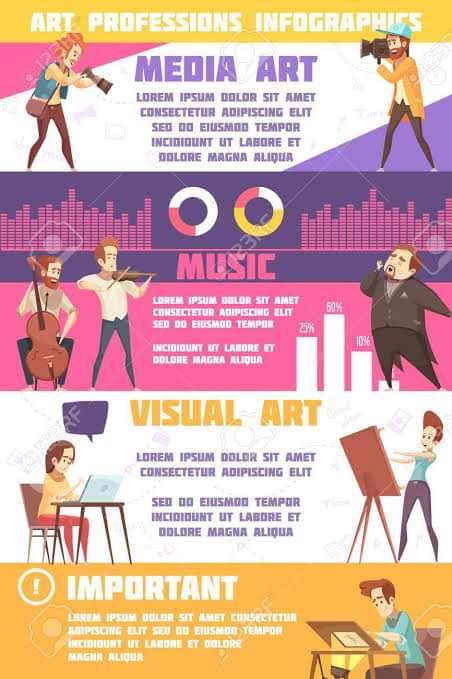
ELECTRONIC BROADCASTING MEDIA
Electronic media is the media that one can share on any electronic device for the audiences viewing, internet to transmit facts, skills, understanding, knowledge and appreciation with the aims of to attract general publics in general and marketers in particular. Popular examples of electronic media are television and radio. (Wikipedia, 2020)
Evaluating electronic broadcasting media content in terms of:
Registers: Electronic broadcasting media sometimes use formal register because less rigid but still constrained, where communication is expected to be respectful, uninterrupted, and restrained. Slang is never used and contractions are rare. However, it also uses consultative register. often in conversation when they are speaking with someone who has specialized knowledge or who is offering advice
Stylistics: Electronic broadcasting media is combined with a general negative view against excessive foul language has tempered electronic broadcasting into a much more “family friendly” media form. They use electromechanical energy or electronics for public to access the content. Main resources of electronic media are CD-ROM, online content, slide presentations, audio recordings, video recordings and multimedia presentations. Emotional appeal and repetition is highly observed.
Grammar: Electronic broadcasting media encompasses any form of media that is primarily consumed through listening. The grammars that they used in conveying the information to the audience are appealing and interested in the ears and eyes of the viewer.
Semiotics: Electronic broadcasting media uses connotation since they are designed to generate culturally-significant meanings. Iconic sign is usually used in advertisements of this media type. Advertisers do this, not only through repetition, but also through the combining of symbols, bringing words, images and music together into one meaningful and coherent composition.
Pragmatics: Its language contains plural codes, which interact to create new meanings or messages. Electronic broadcasting media uses the language without any opinion to the audience and convey the information just like they are interacting to the audience.


OUTDOOR MEDIA
Outdoor media is typically consisting of any advertising seen outside of the home, and is primarily grouped into a few specific categories such Billboards, posters and transit to name a few. Outdoor advertisements are the best medium to inform the moving population. Once an advertisement board is installed at a place, it usually remains there for a fairly longer period. What is best in outdoor media is that it can be displayed at a place where best impact can be created. (Nguyen, 2020)
Evaluating outdoor media content in terms of:
Registers: It uses casual register because it is probably use when you consider how you talk with other people, often in a group setting—marketers to be specific. Use of slang, contractions, and vernacular grammar is all common in Outdoor media. Also, Outdoor media uses the static register wherein it contains government agency rules, proposed rules, and public notices.
Stylistics: Outdoor media often uses public notices in advertising to different locations. It also uses figurative languages to make their advertisement more reliable and catchier to the commuters or even to the tourists. Outdoor media uses visual techniques to make the viewers more attentive and languages are more powerful in visualizing their ads for the commuters and tourists to have a desirable view.
Grammar: Just like any advertising and marketing strategy, outdoor advertising requires research and preparation so that their use of grammar may not be mistaken because it can affect their viewer’s insight about their advertisement.
Semiotics: When it comes to branding and advertising, semiotics can provide some amazing insights. In some cases, the sign can be an exact representation of the thing being signified, while in other cases, it may be a symbol associated with it. In outdoor media, they use image to visualize the product being sold. They also use word to convey a message with the same effectiveness as an entire picture. It uses the Rule of Thirds and The Golden Mean.
Pragmatics: Outdoor media uses words and images to advertise their products and the words and pictures that they are using, connects to the understanding of the people. The words and images they used are more attractive, catchy and have a bigger size for their viewers to be more interested in their advertisement.

TRANSIT MEDIA
Transit media refers to advertising placed in, on, or around modes of public transportation: buses, subways, and taxis, as well as at bus, train, and subway stations. Transit media can be a great way to reach a really diverse audience: families traveling to daycares, professionals heading to work, tourists navigating a new town, or even students making their way to a local coffee shop. (Hendricks, 2020)
Evaluating transit media content in terms of:
Registers: Conversational register is often used in this type of media because of its target audience.
Stylistics: Placing a message outside targets a larger audience and is recognized by three quarters of passing individuals. It serves as a last minute reminder or as impulse motivator at pricely a time when real and potential consumers are on the move. Exterior bus posters, displayed on the front, back, and sides of the vehicle, offer advertisers high exposure, particularly in largeurban areas. There are commuters and tourists, or people in cabs, rental cars, and on foot who can see the rolling billboard go by. According to "The Complete Guide to Creative Out-Of-Home Media Forms," bus exteriors are available in 80 to 85 percent of the top 100 markets in the United States on more than 36,500 buses. The bus exteriors provide "mass audience exposures" that are repeated and reinforced as they follow the same routes every day. The more innovative, intriguing and humorous it is, the better.
Grammar: The message should be brief consisting of at least 3-5 words.
Semiotics: It also helps that nearly all transit ads are available at eye level with large graphics and text. The message should be legible. Colors are used to contrast each other. It builds a recognizable format or layout that catches the briefest eyes contact.
Pragmatics: Every transit agency that advertises has guidelines dealing with "objectionable" material. The problem comes in defining what might fall into that category. Seventy percent of the respondents indicated that they had formal, written guidelines addressing ad content. The restrictions differ throughout the transit industry, but generally include some variation of the following prohibited content: illegal, indecent, or immoral ads; political, alcohol, or tobacco ads; libelous, obscene, or profane ads; ads that ridicule individuals or groups of people; advocacy of or opposition to a religion, denomination, tenet, or belief; violent, criminal, or anti-social behavior; false, misleading, or deceptive ads; adult materials and services; explicit sexual material; pornography or businesses that traffic in pornography; and advertising that appears as graffiti, gang signs, or symbols.

DIGITAL MEDIA
Digital media are any media that are encoded in machine-readable formats. Digital media can be created, viewed, distributed, modified and preserved on digital electronics devices. Examples of digital media include software, digital images, digital video, video games, web pages and websites, social media, digital data and databases, digital audio such as MP3, electronic documents and electronic books. (Richard, 2013 as mentioned in Wikepedia, 2020).
Evaluating digital media content in terms of:
Registers: It uses casual register or consultative register because it is probably use when you consider how you talk with other people, often in a group setting—marketers to be specific.
Stylistics: User-generated content raises issues of privacy, credibility, civility and compensation for cultural, intellectual and artistic contributions. The spread of digital media, and the wide range of literacy and communications skills necessary to use it effectively, have deepened the digital divide between those who have access to digital media and those who don't. Each digital media network has its own intended purpose and audience. Understanding this and matching your content and tone to the proper social media outlet is imperative for success..
Grammar: Gumpart & Cathcart examined how new media develop their own grammars, the way individual acquire media literacy, and the effect of media literacy on ways people relate to the world and each other. It concludes that people develop different states of media consciousness based upon the… media grammars, and that particular consciousness produce media gaps which separate people.
Semiotics: When it comes to graphics, it uses color psychology. Photos and videos can boost your social media strategy. Tweets that feature images earn 150 percent more retweets are favorited 89 percent more and lead to 18 percent more clicks. Typing in all capital letters is visually alarming, they also communicate that you’re upset (and yelling) about something. It should be avoided. When used correctly, hashtags will increase your online visibility and followers. When used in excess, it looks spammy and becomes ineffective.
Pragmatics: Its language contains speech acts like constatives (assertive, concessives, suggestive, suppositive, responsive), directives (request, question & requirement), expressives (thank, accept, reject, negative opinion & positive opinion) and attachments (link, code & log).

CONCLUSION
Media has evolved rapidly over the last couple of centuries. These changes brought a lot of convenience in accessing different types of information, from typical newspapers to our smartphones. It provided an ocean of information these days, but “we need to be critical enough not to drown in hoaxes and misinformation.” Hence, it is our duty to be responsible consumers of information, regardless of media type, and to examine every small detail we see and hear on the media. Indeed, “media is a blessing for humans as it plays a vital role in our personal lives and many other walks of our lives.” It lies upon us who decide whether “media is a blessing or a curse.”
REFERENCES:
Gray, J. (2008). How to move into moving media: Transit Media. Journal of Marketing. Retrieved from https://journals.co.za/content/mfsa1/2008/04/EJC74350
Gumpert, G. & Cathcart, R. (2009). Media grammars, generations, and media gaps. Retrieved from https://doi.org/10.1080/15295038509360059
Appelman, A. & Bolls, p. (2011). Article Recall, Credibility Lower with Grammar Errors. Newspaper Research Journal. Retrieved from https://doi.org/10.1177/073953291103200205
Herrmann, E. (2015). Language Register: What is it and why does it matter in education? Retrieved from https://exclusive.multibriefs.com/content/language-register-what-is-it-and-why-does-it-matter/education
Nordquist, R. (2019). What is Register in Linguistics? Retrieved from https://www.thoughtco.com/register-language-style-1692038
Eilders,C. (2016). Print Media. Retrieved from https://onlinelibrary.wiley.com/doi/epdf/10.1002/9781118541555.wbiepc193#accessDenialLayout
Wikipedia (2020). Digital Media. Retrieved from https://en.wikipedia.org/wiki/digital_media
Wikipedia (2020). Electronic Media. Retrieved fromhttps://en.wikipedia.org/wiki/Electronic_media
Oaks, D. (2011). Rethinking the role of grammar in advertising and marketing curriculum. Retrieved from https://journals.sagepub.com/doi/abs/10.1177/073953291103200205?journalCode=nrja#:~:text=It%20was%20observed%20that%20grammar,retention%20and%20low%20perceived%20credibility.
Nguyen, G. (2020). Types of Outdoor Media. Retrieved from https://penji.co/types-of-outdoor-advertising/
Oxford Reference (2020). Print media. Retrieved from https://www.oxfordreference.com/view/10.1093/oi/authority.20110803100346392
Lewis, J. (2020). Semiotics in Advertising. Retrieved from https://smallbusiness.chron.com/examples-semiotics-advertising-38593.html#:~:text=Semiotics%20are%20frequently%20used%20in,symbol%20that%20signifies%20something%20else.
Encyclopaedia Britannica (2020). Semiotics. Retrieved from https://encyclopaediabritannica./semiotics
Authors:

Frenza Mae G. Arcega

Joshua D. Dagami

Mary Jane Labutap
1 note
·
View note